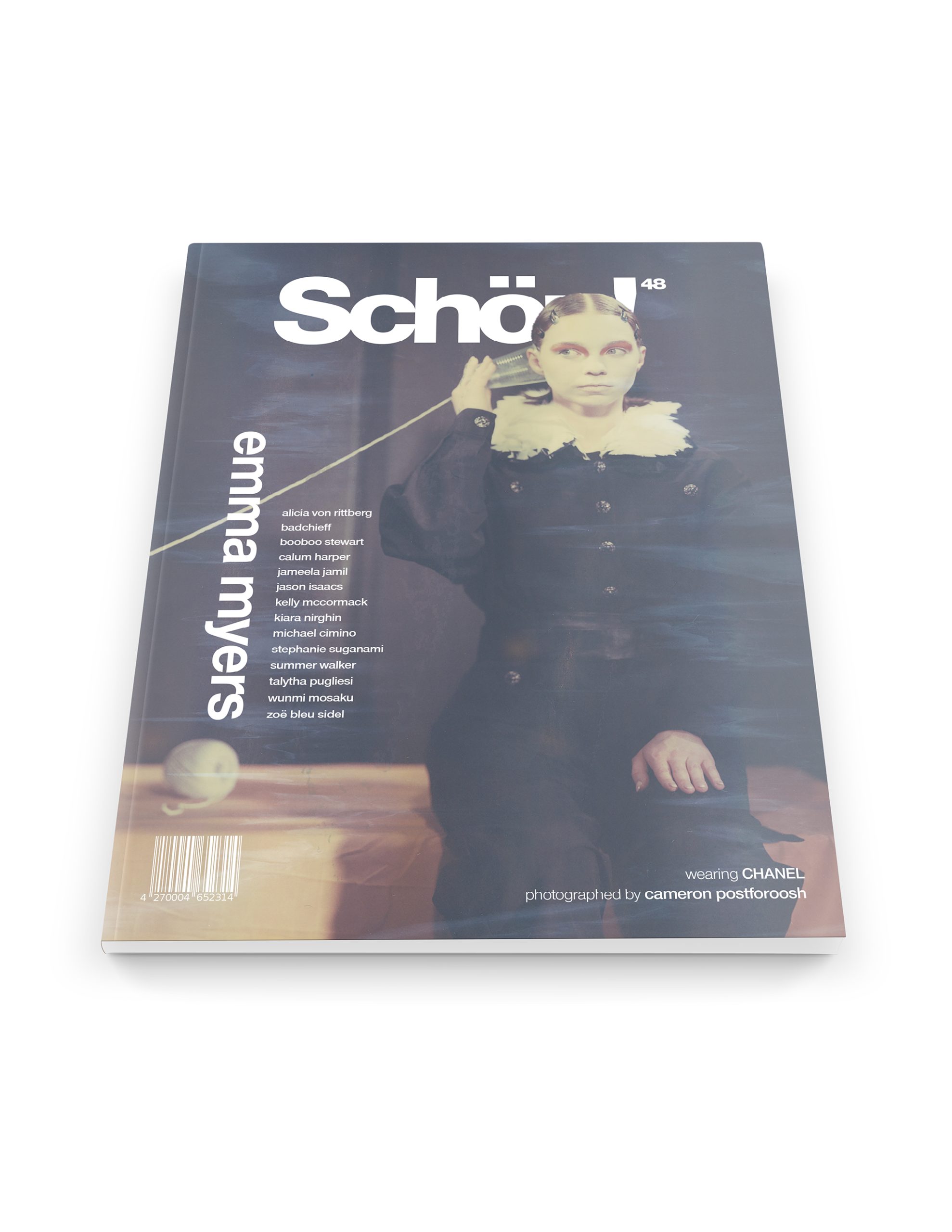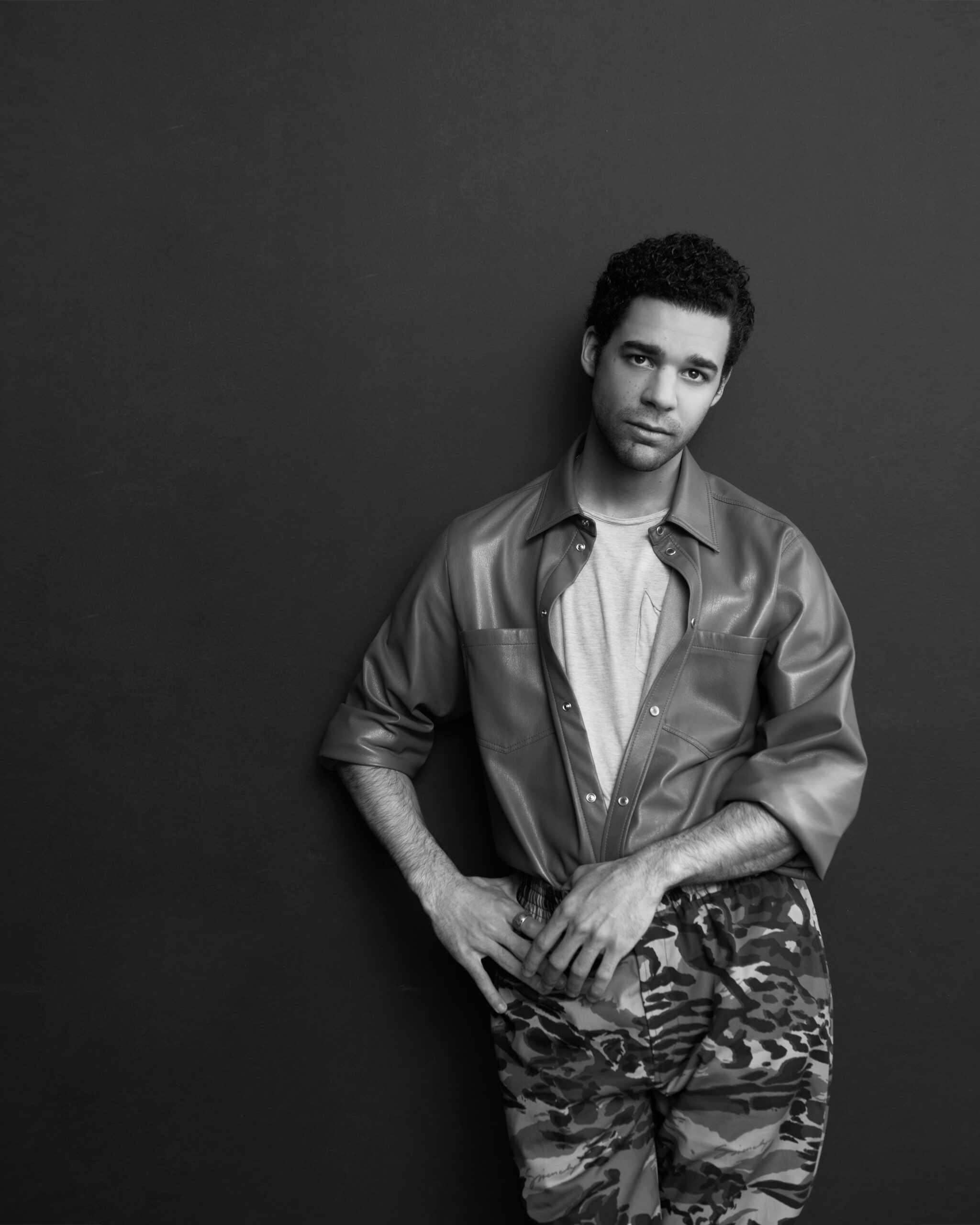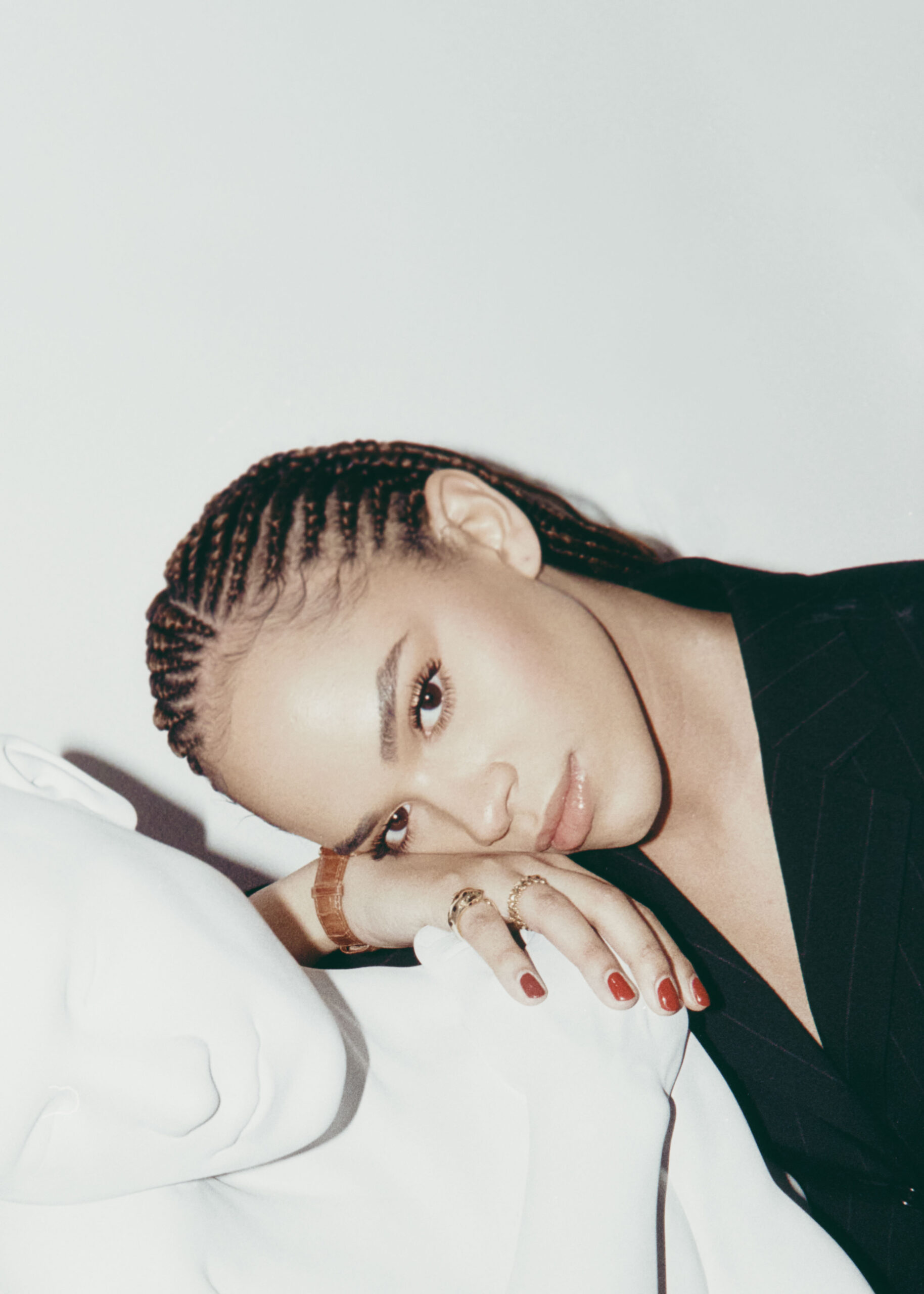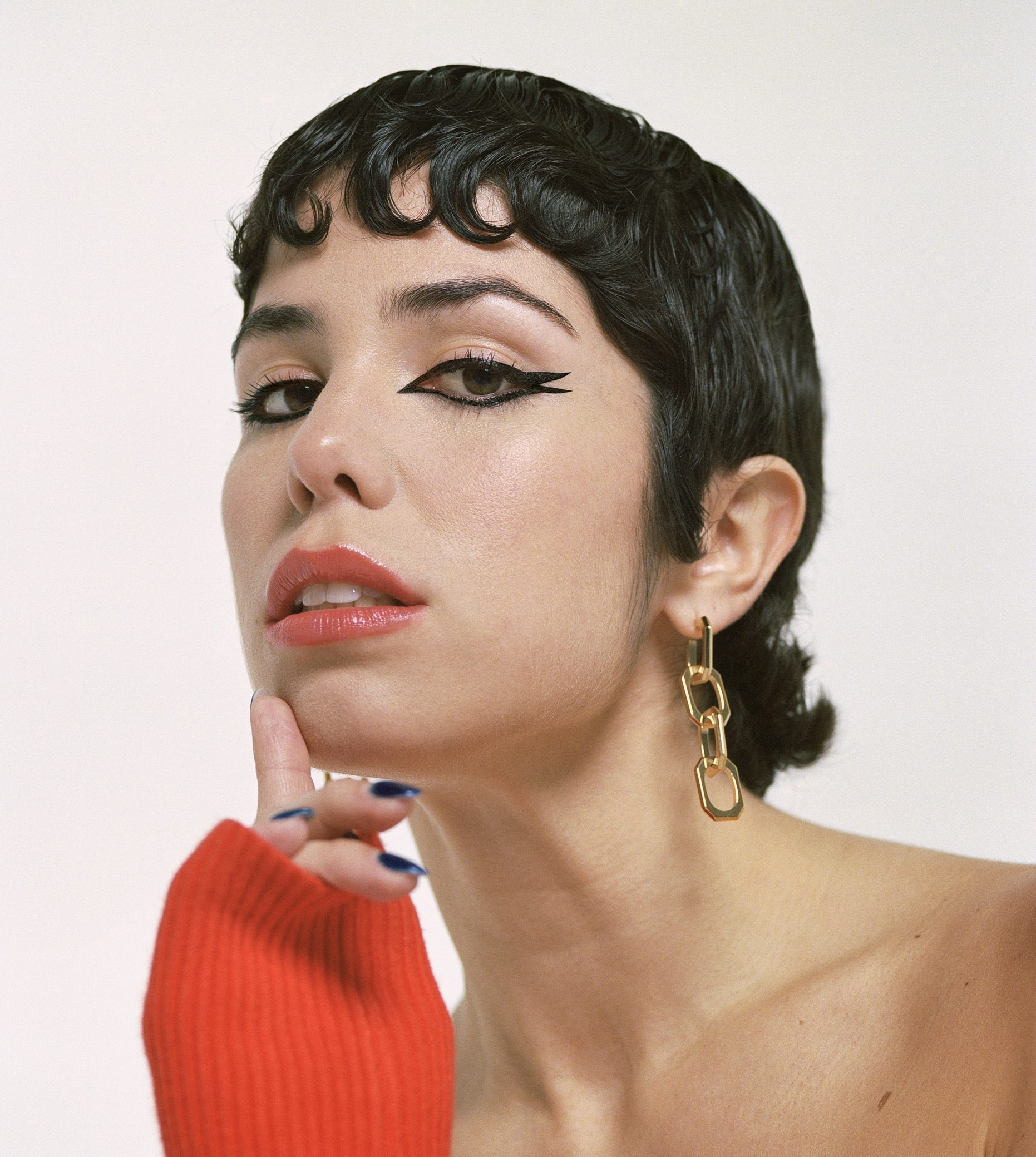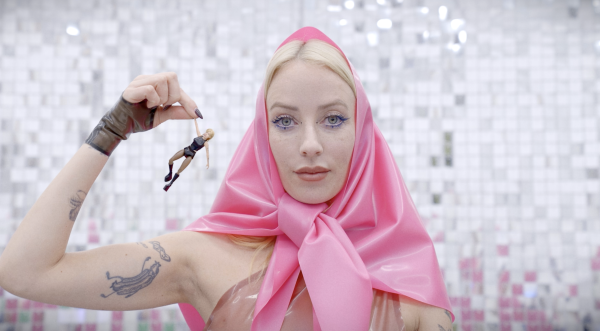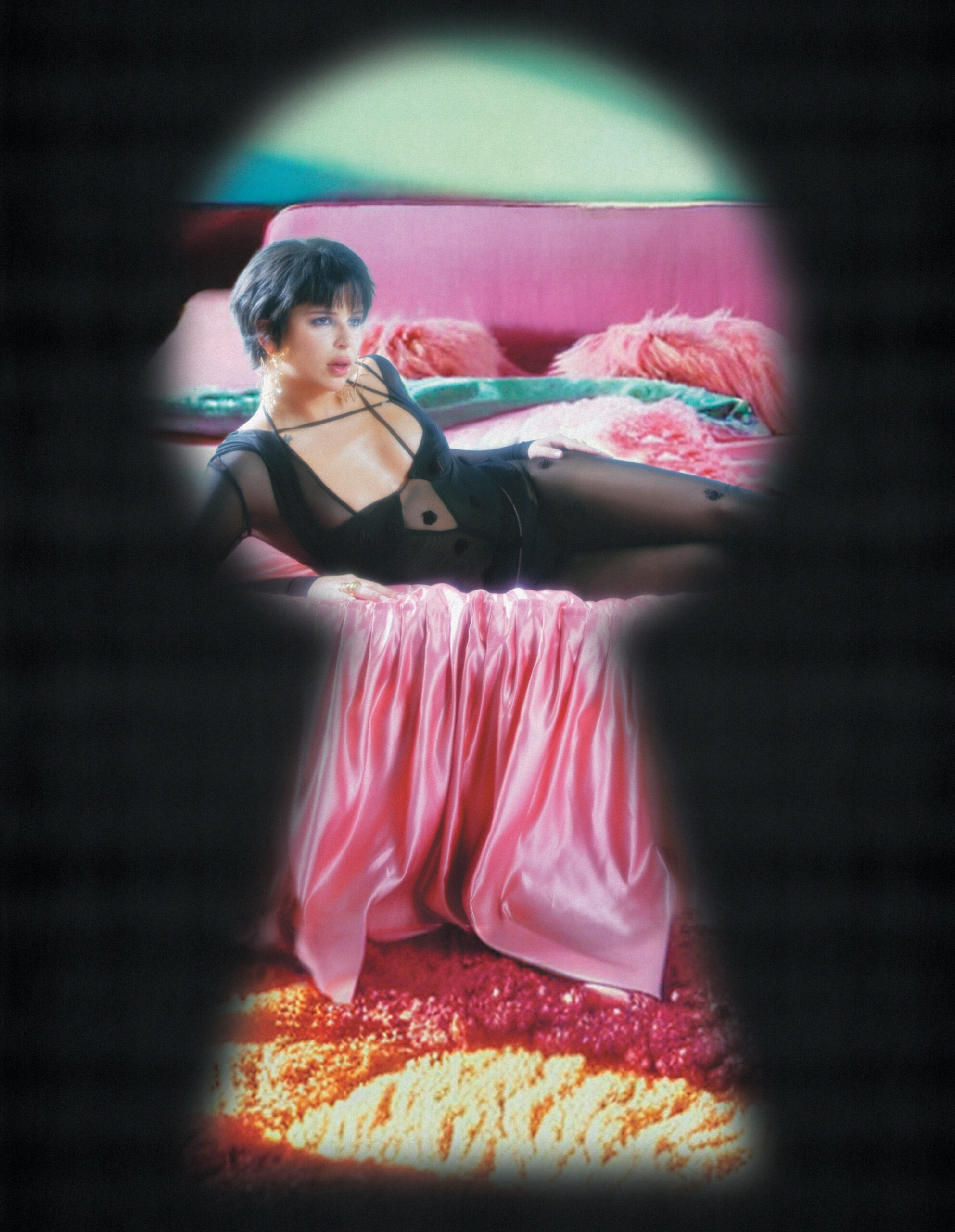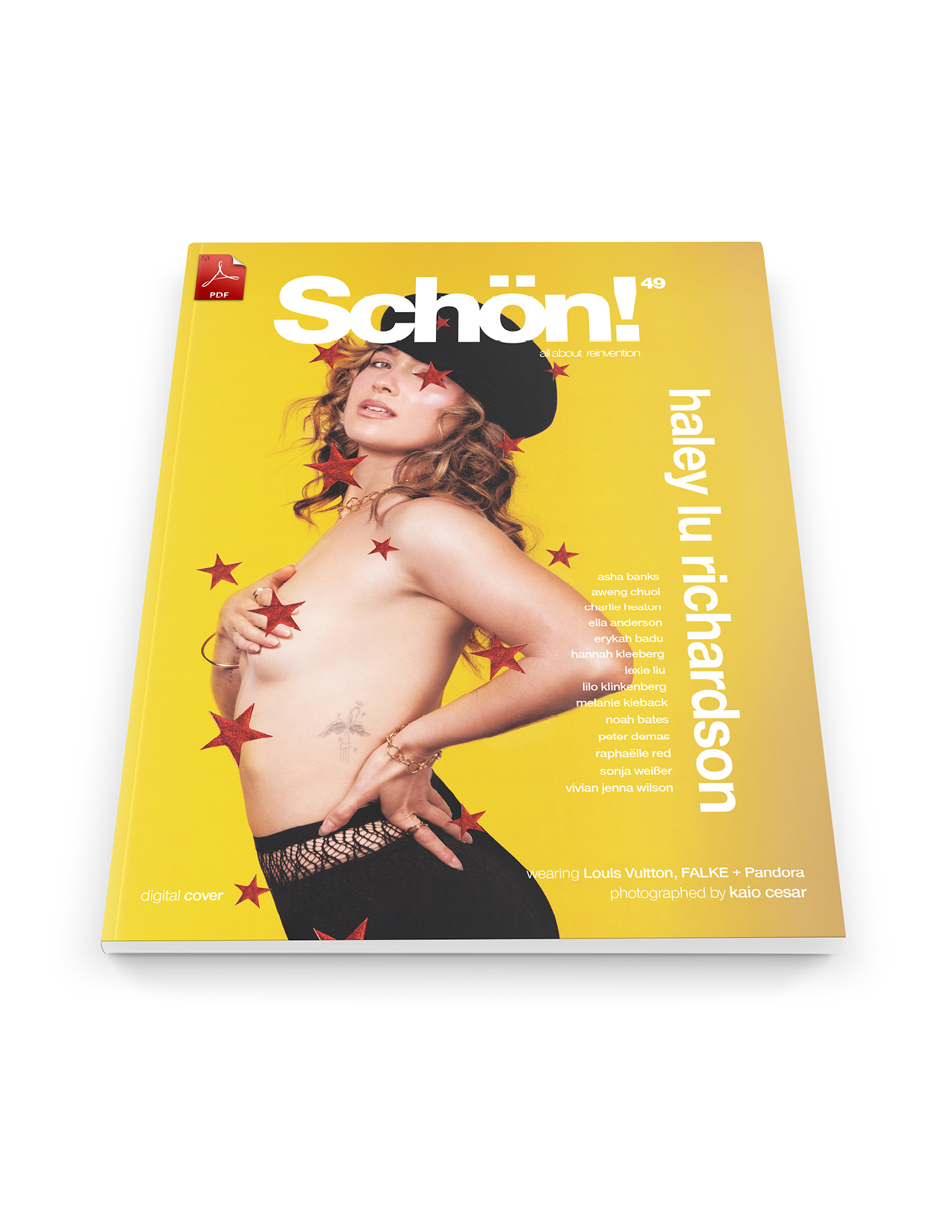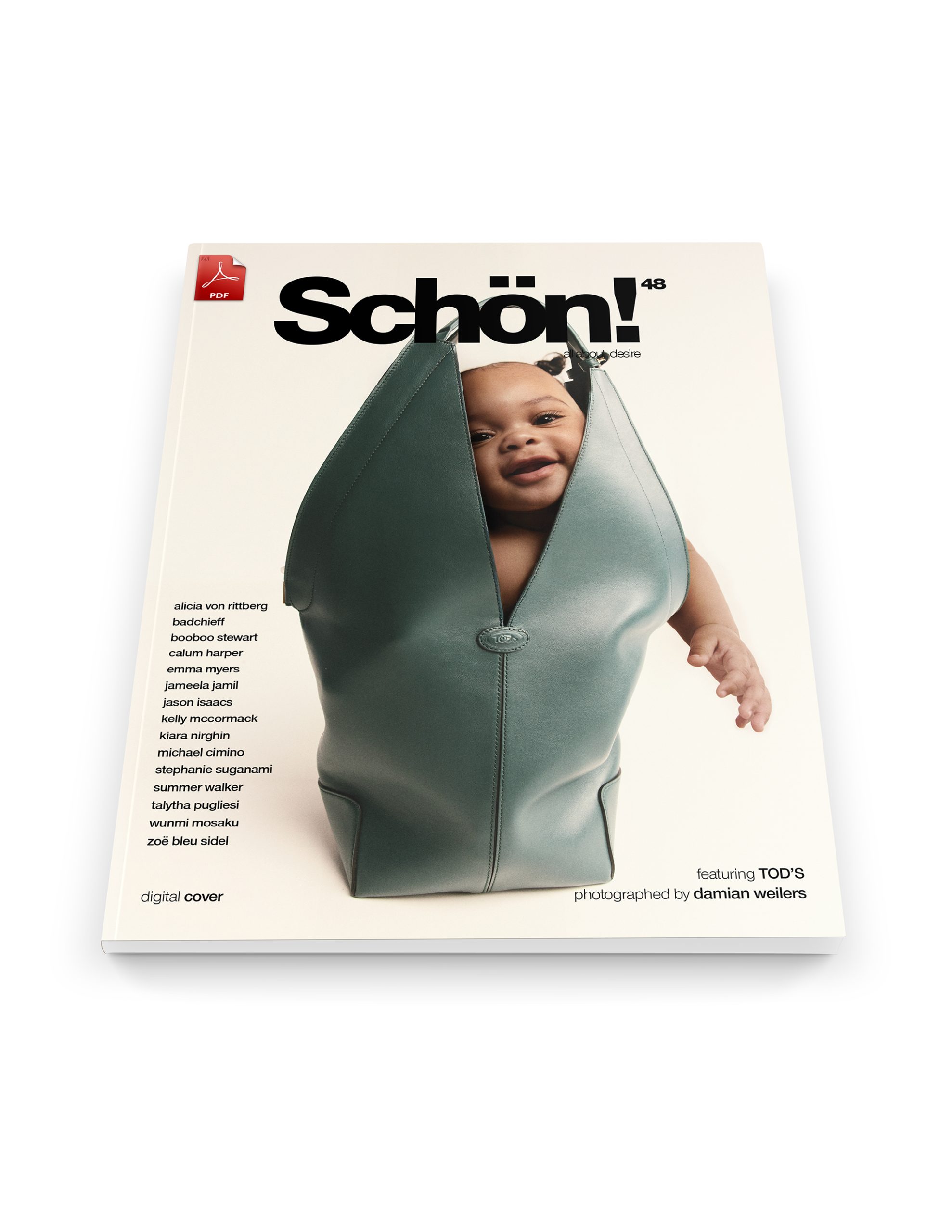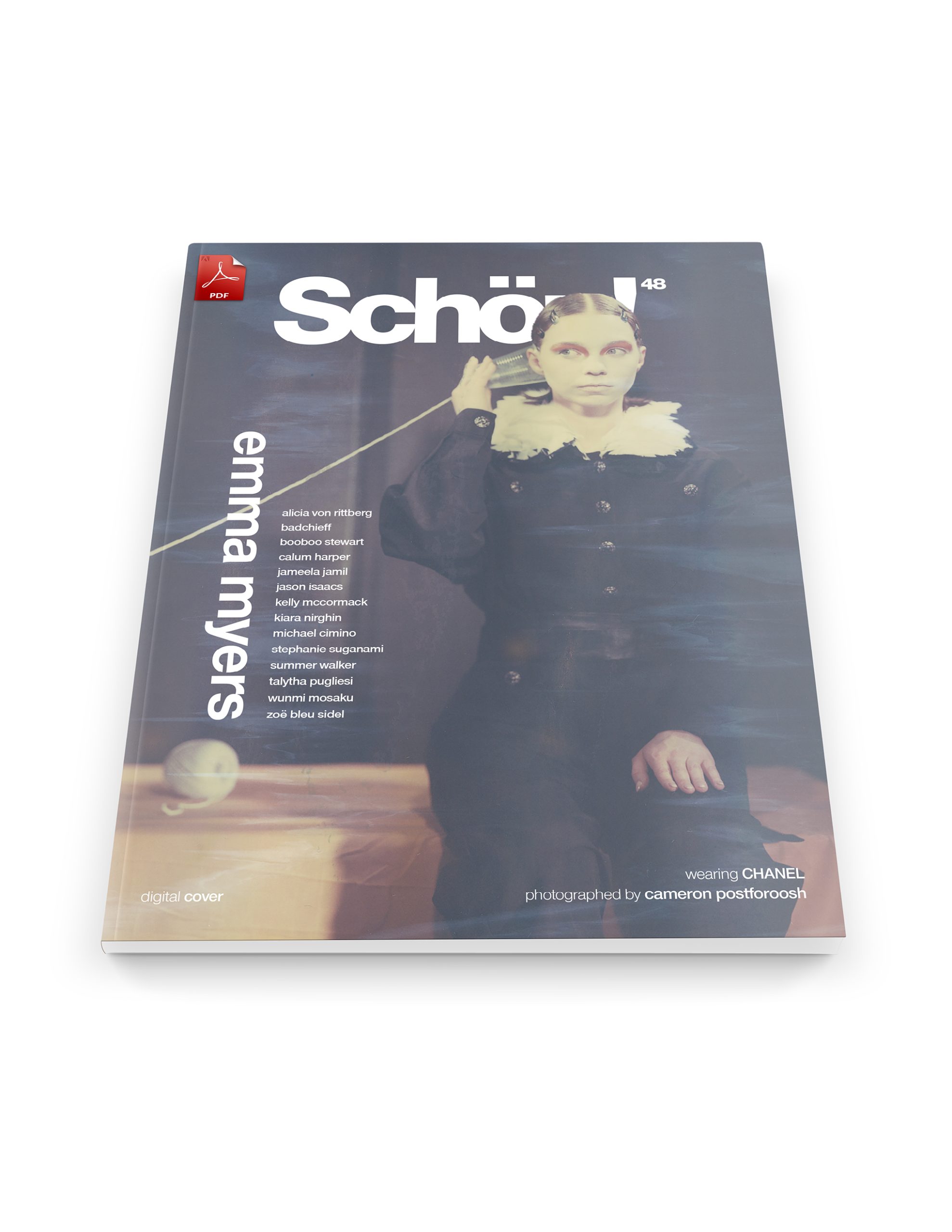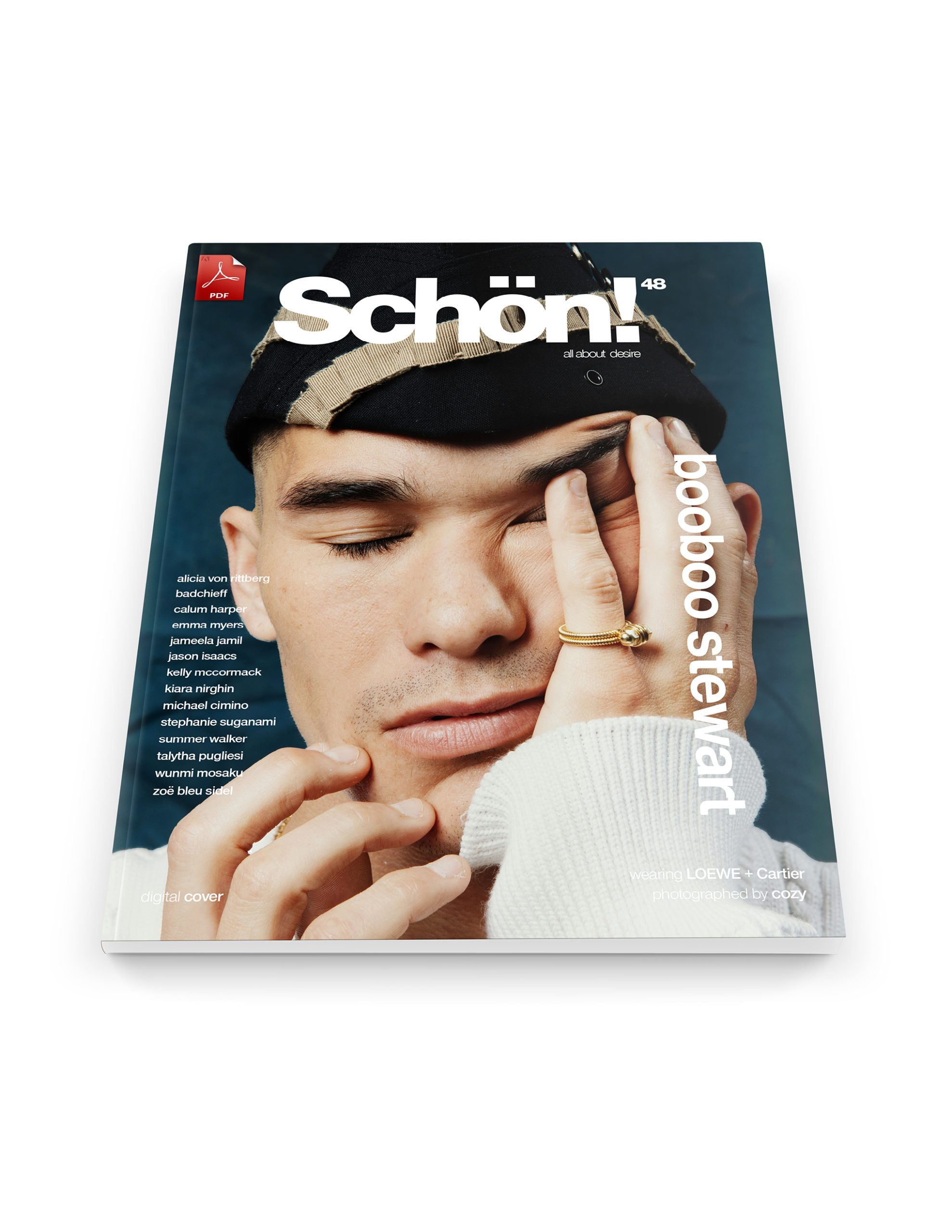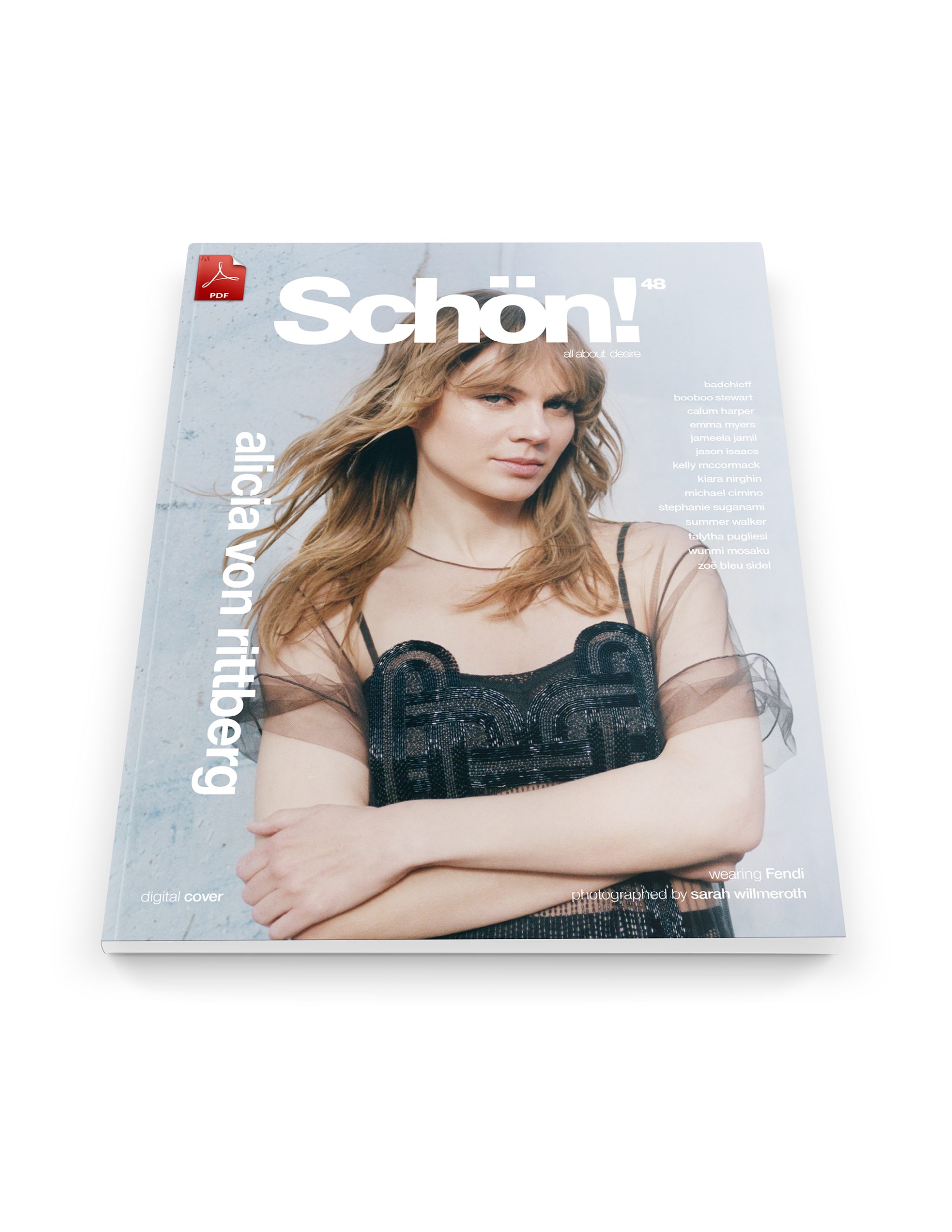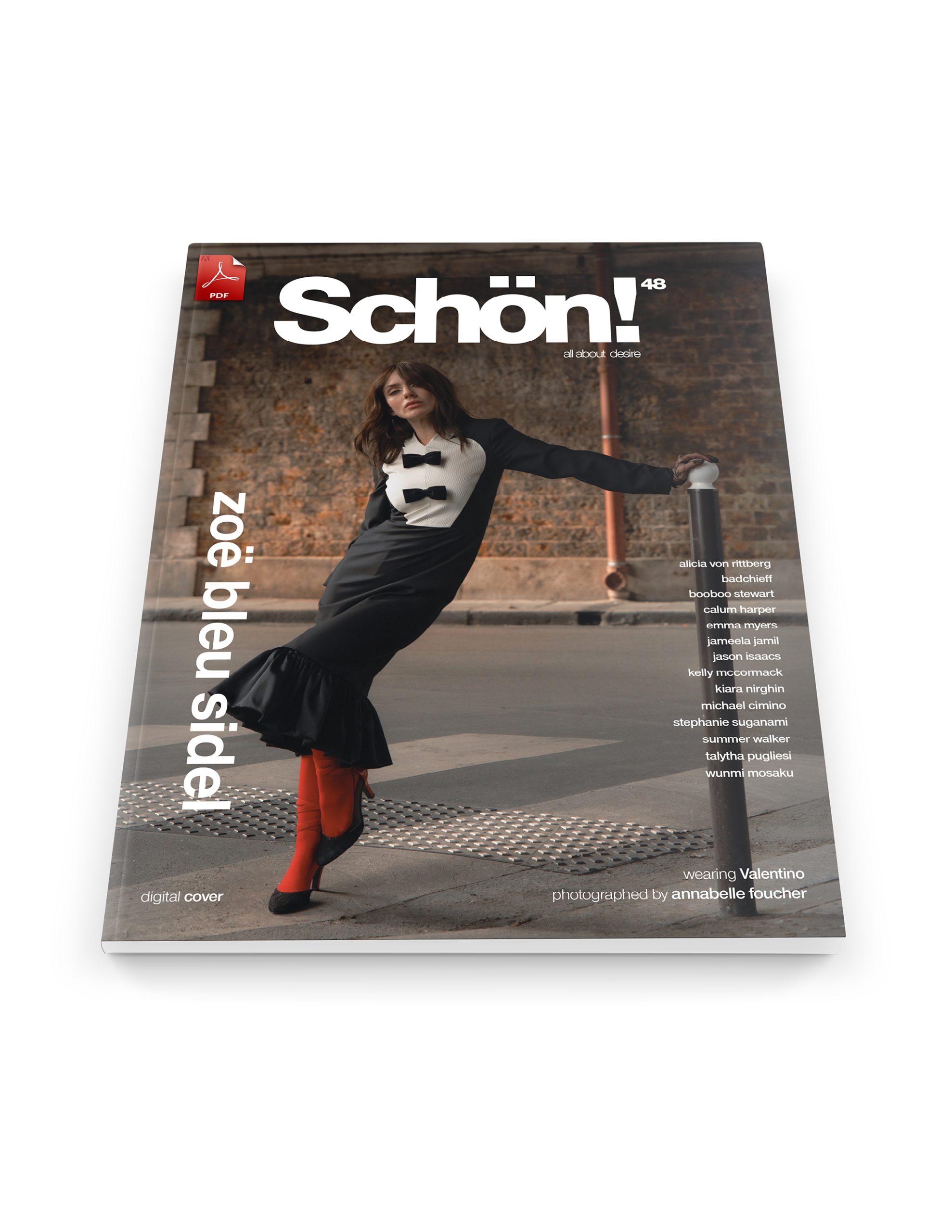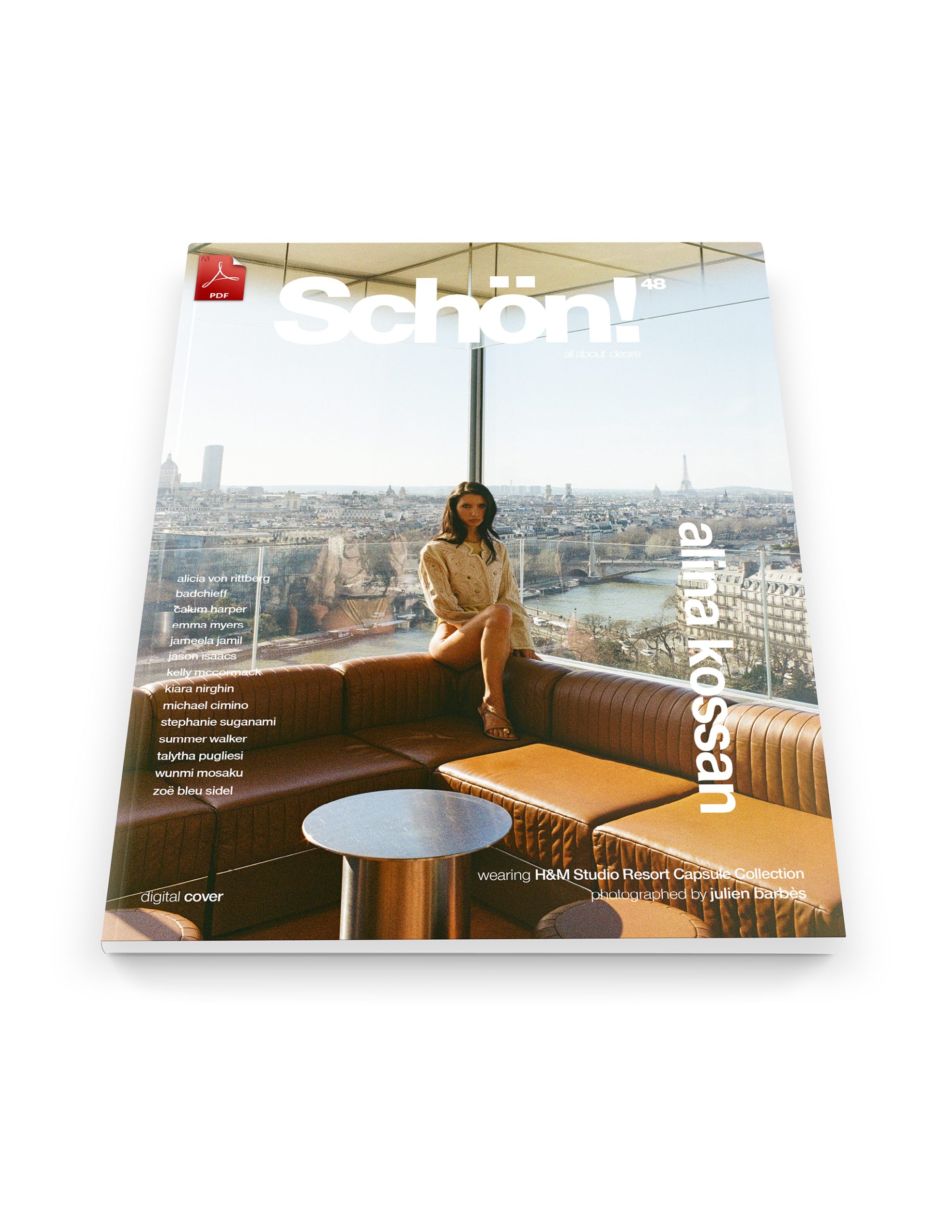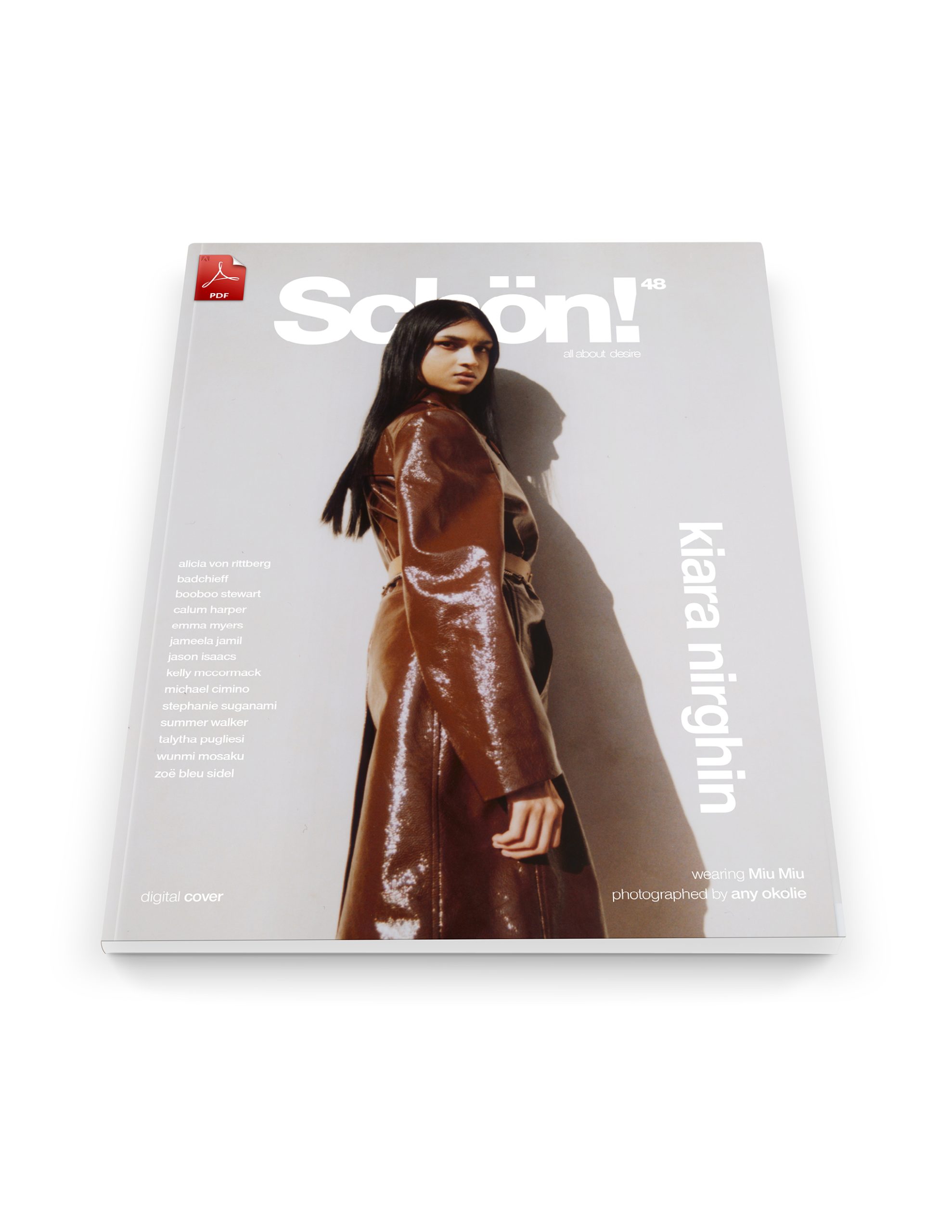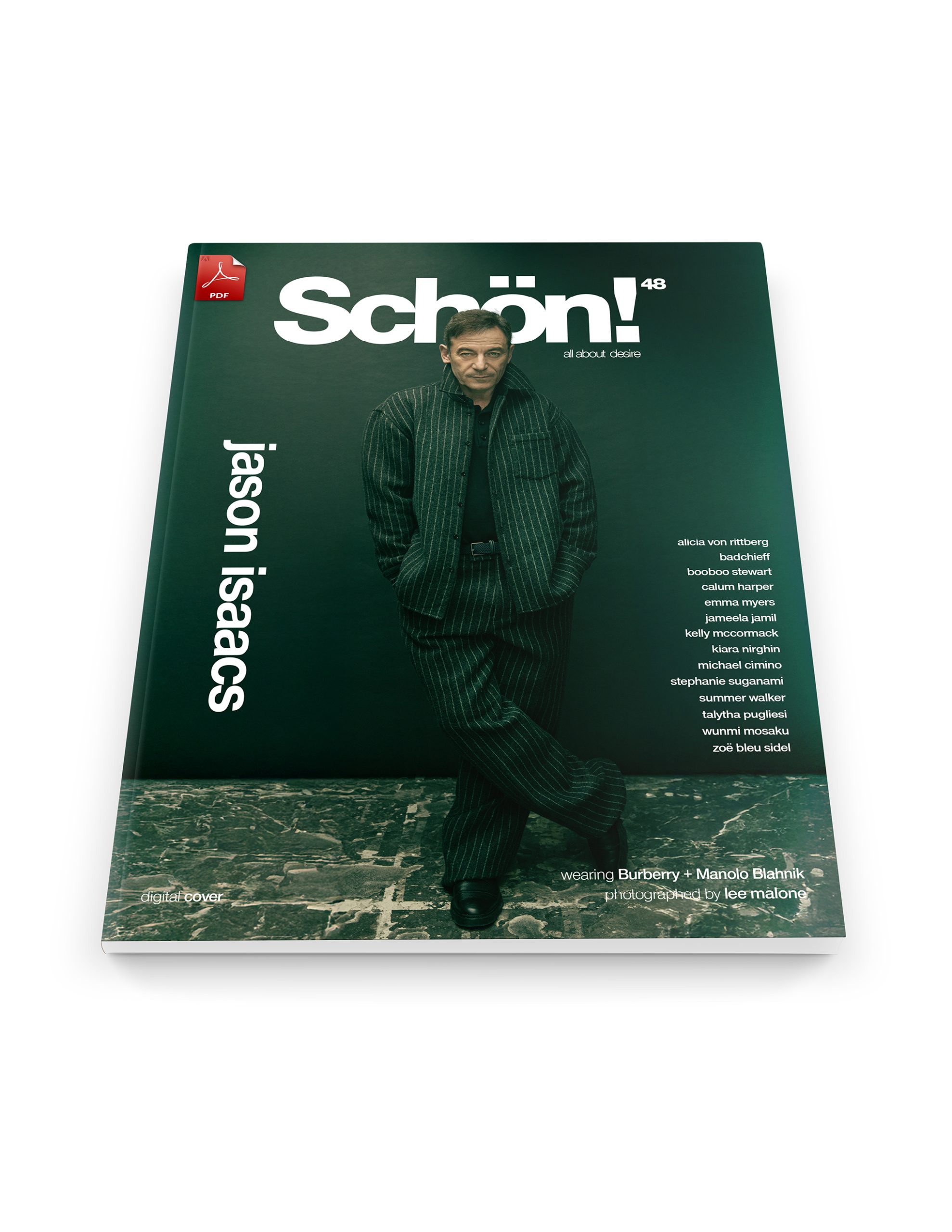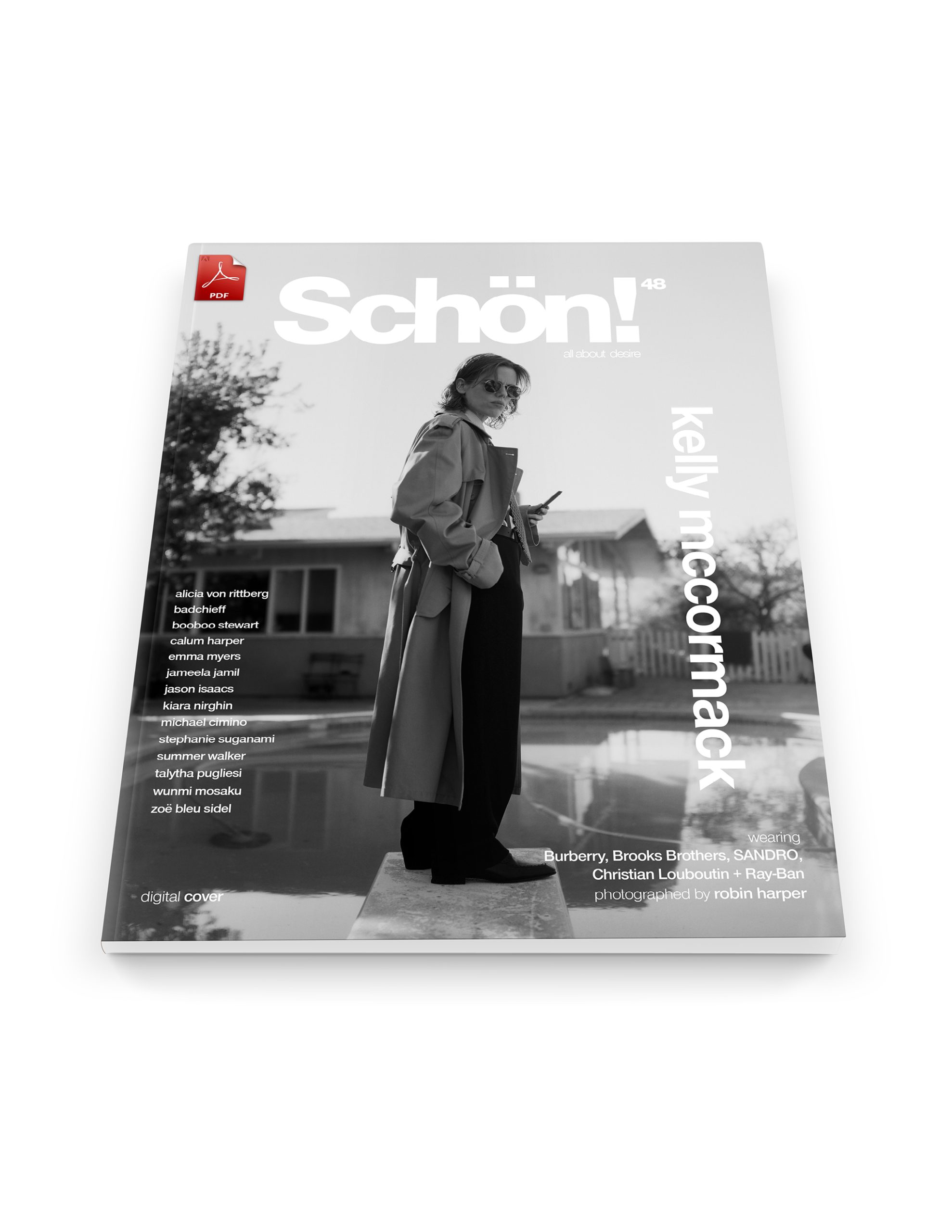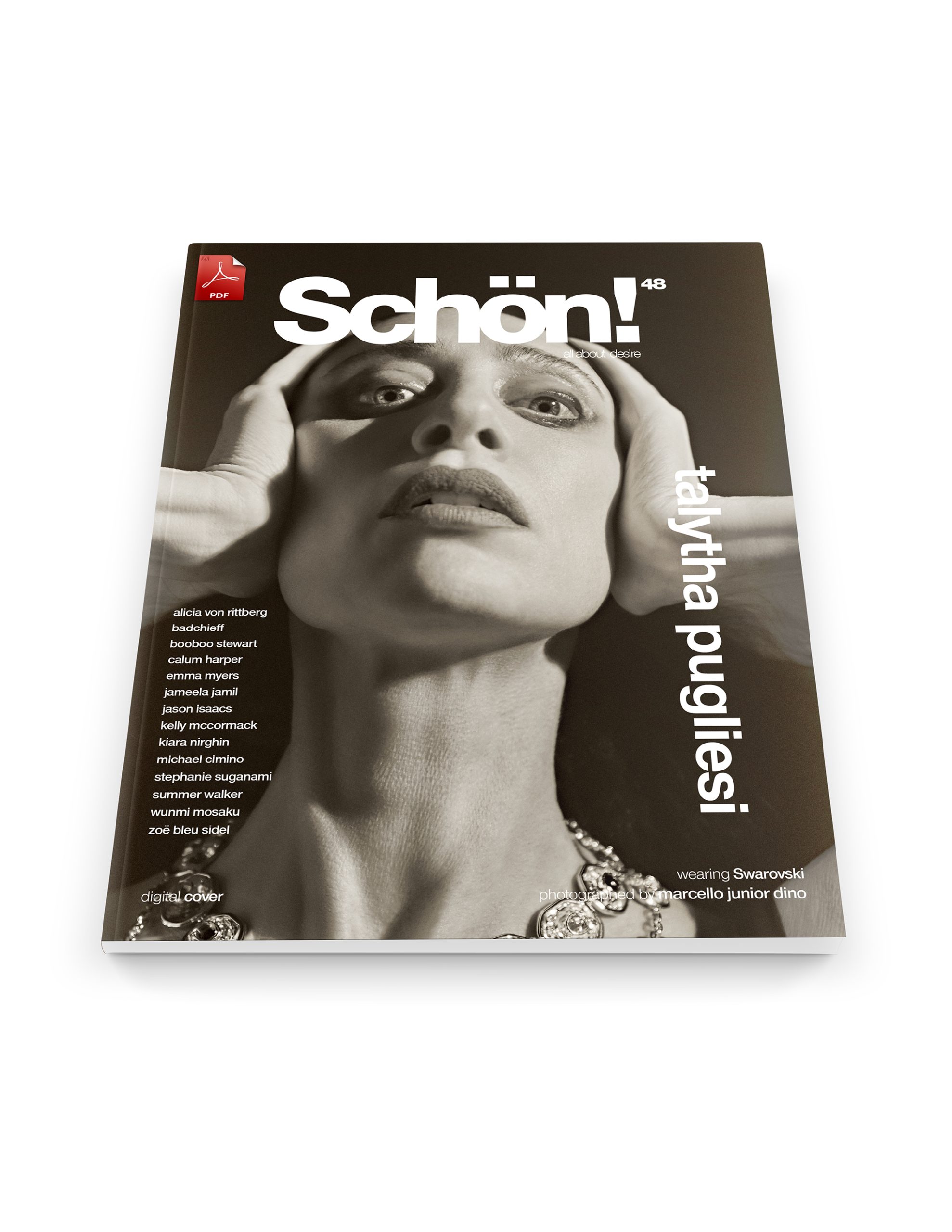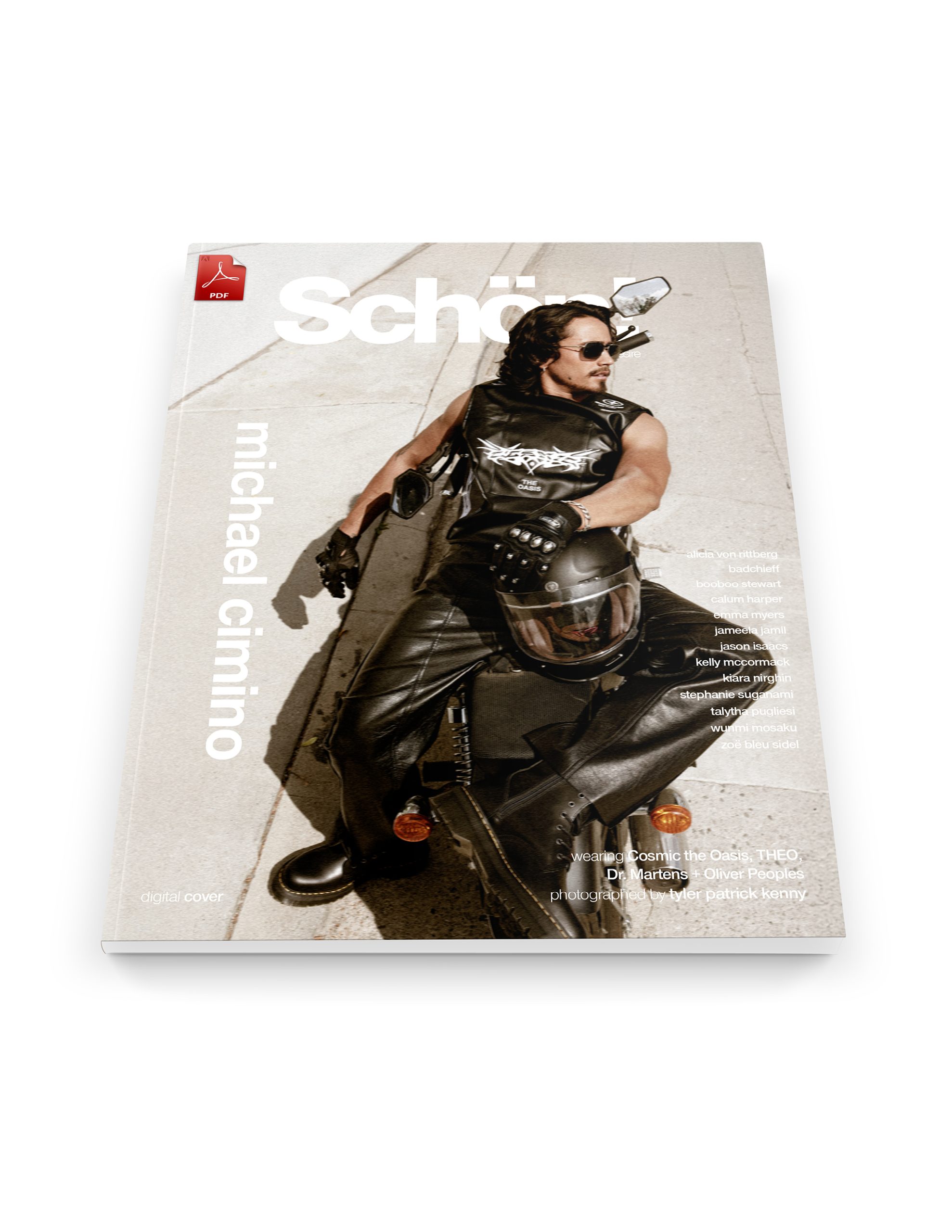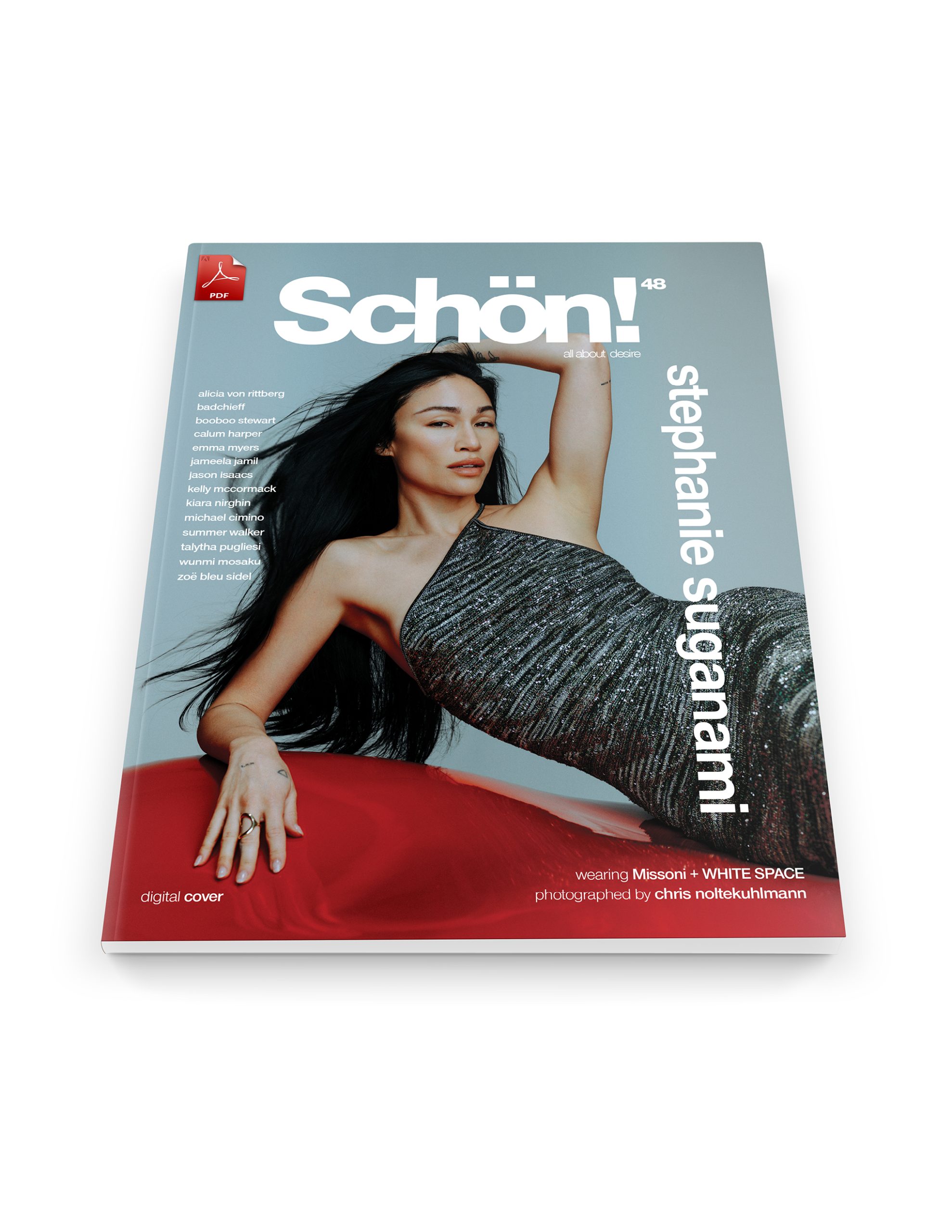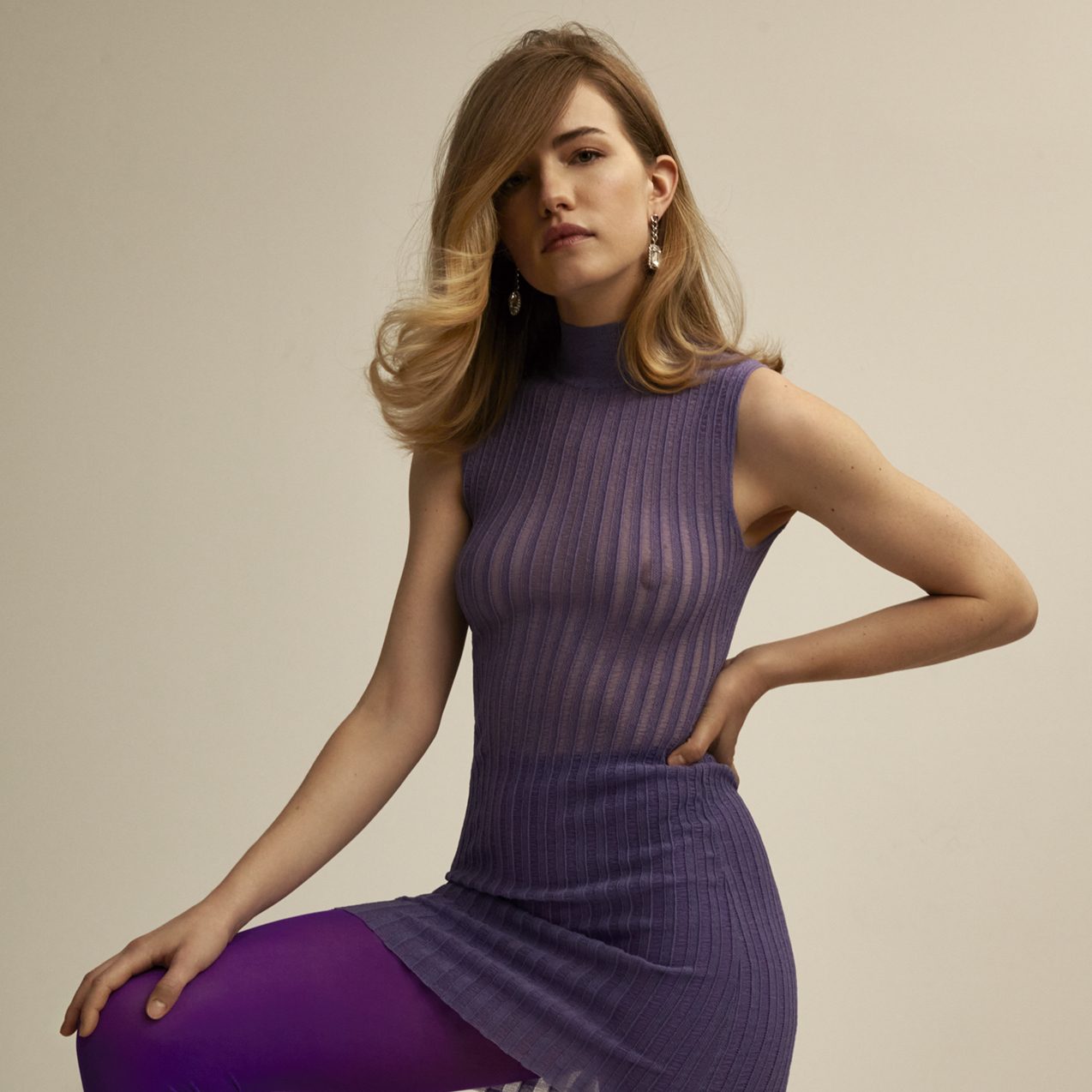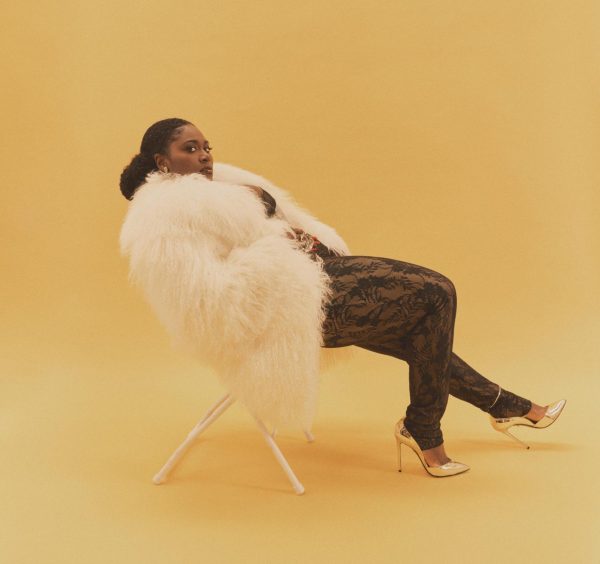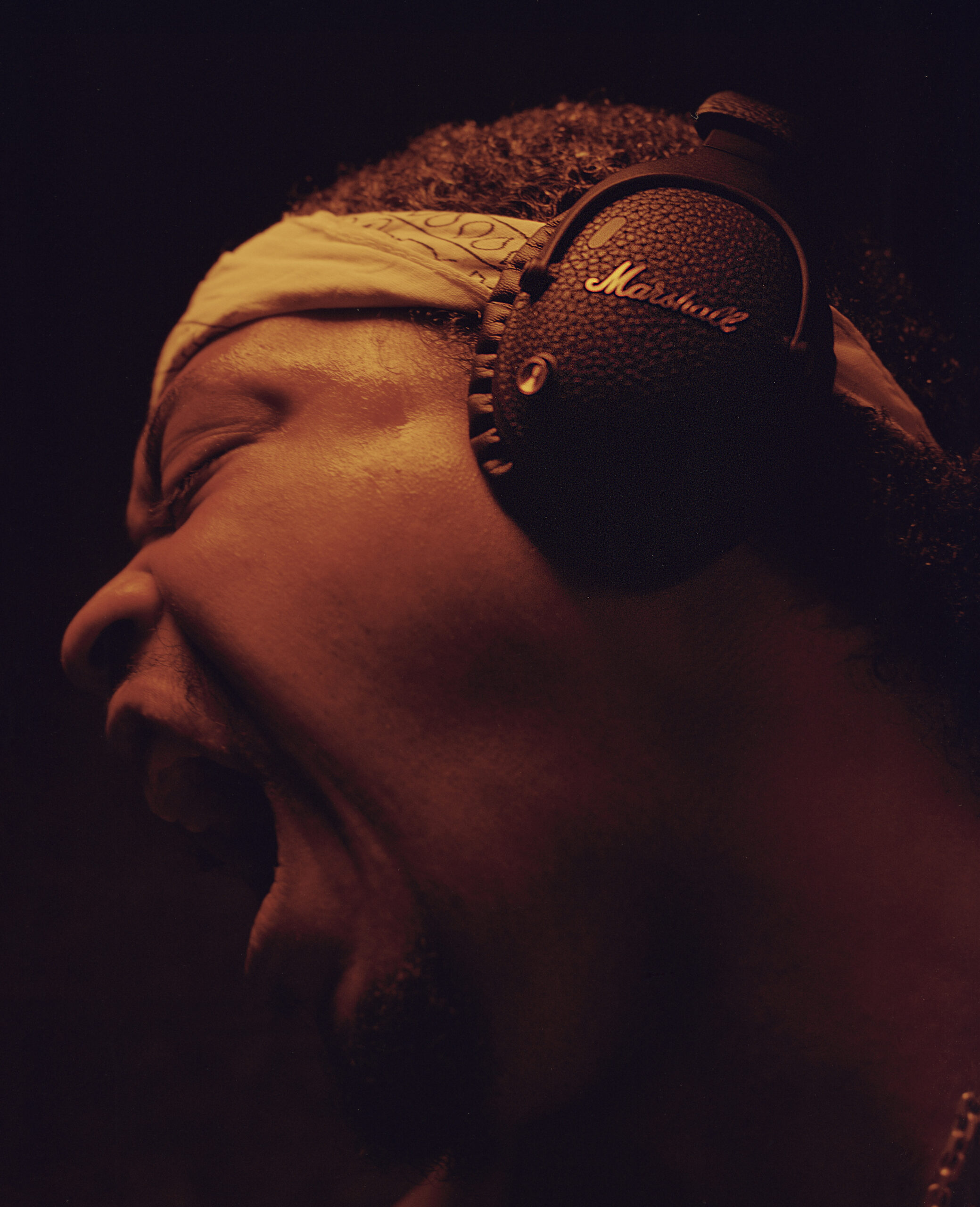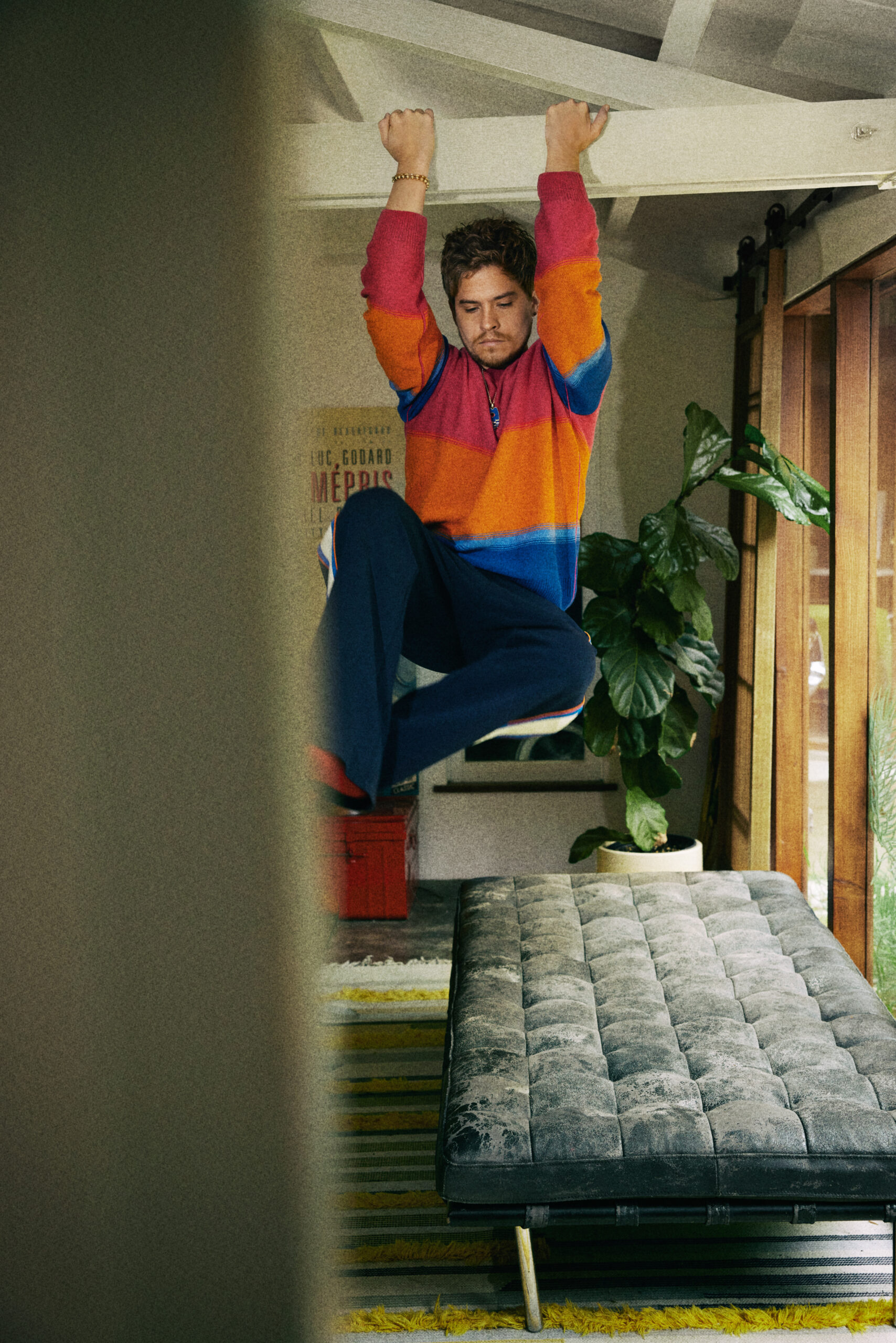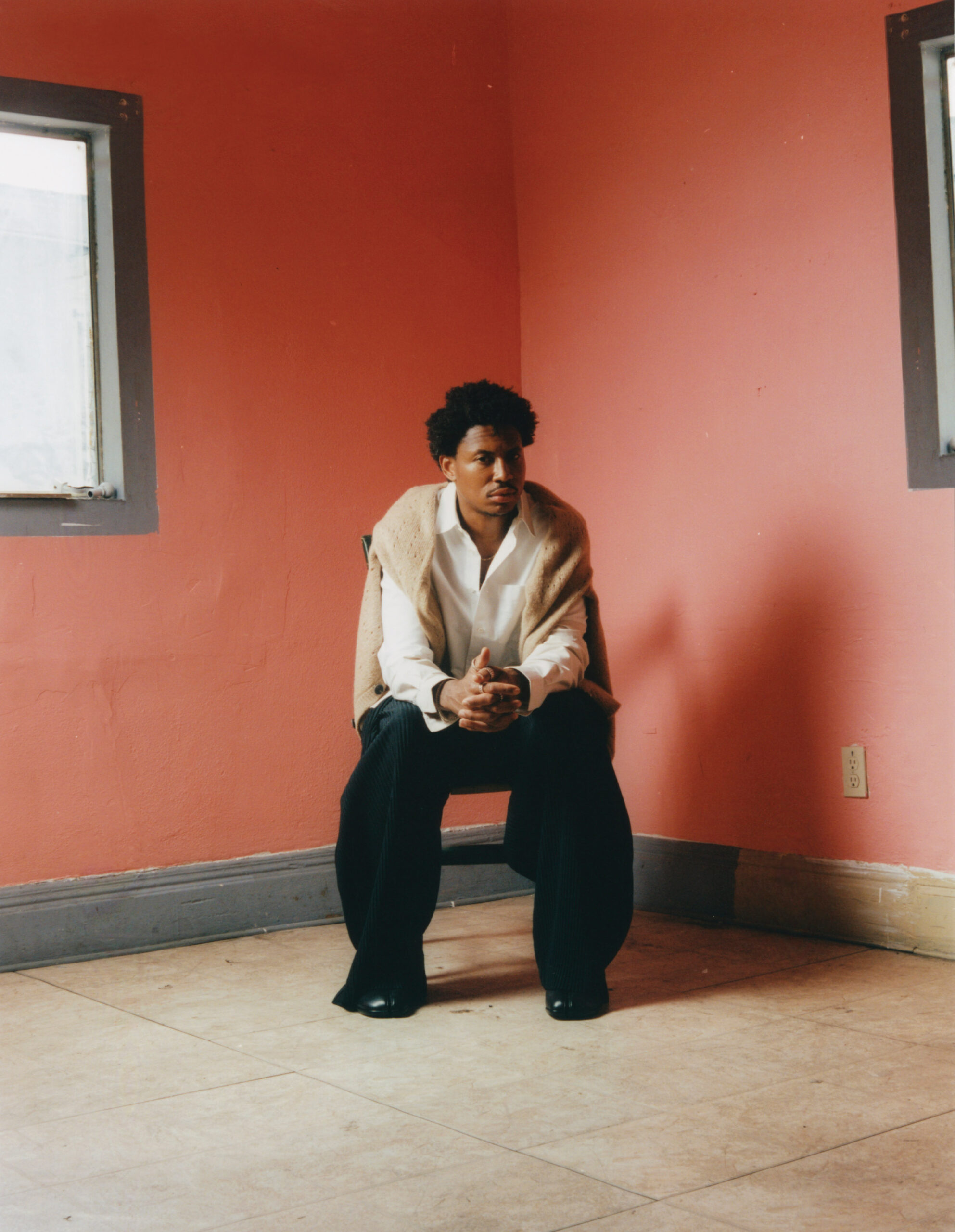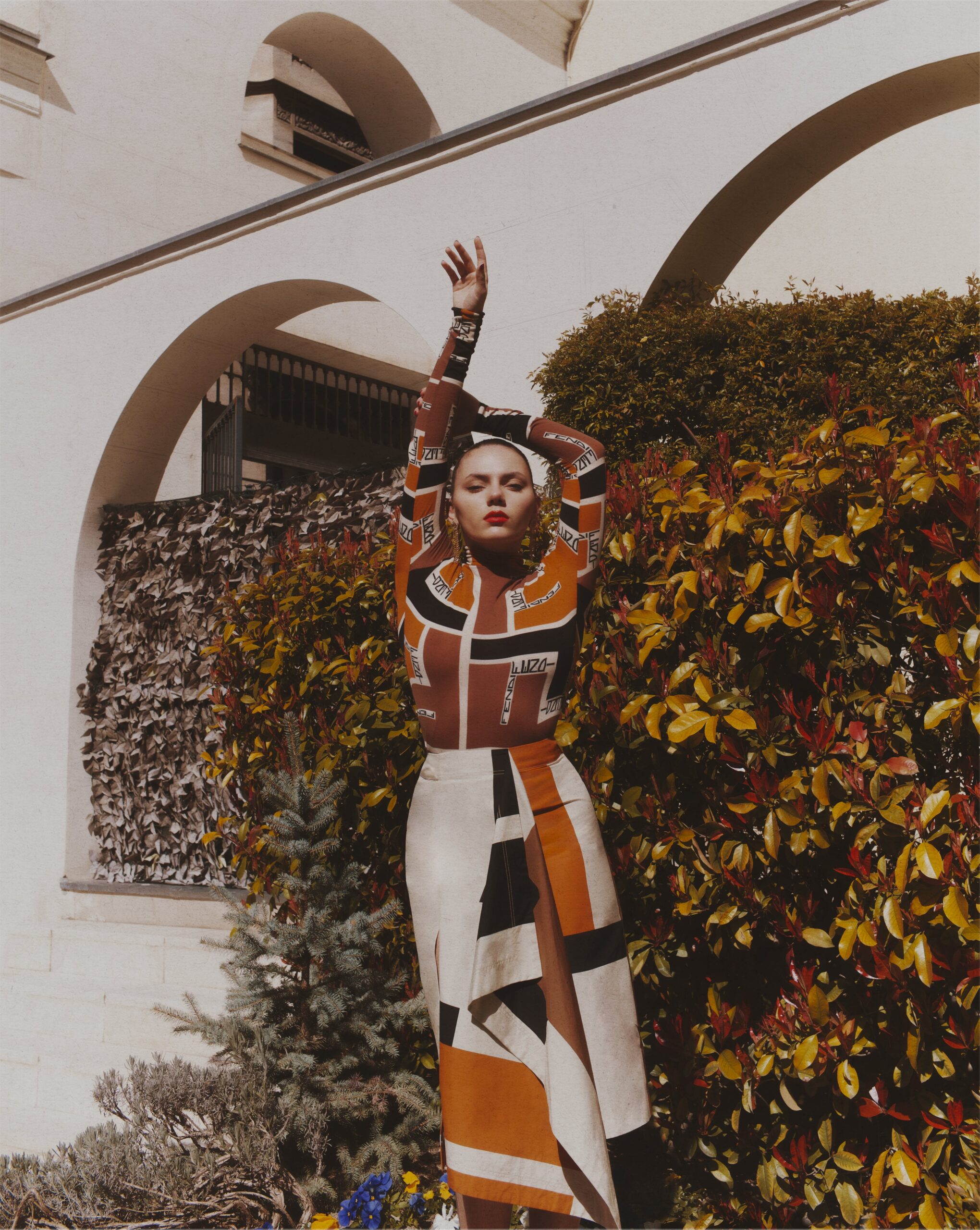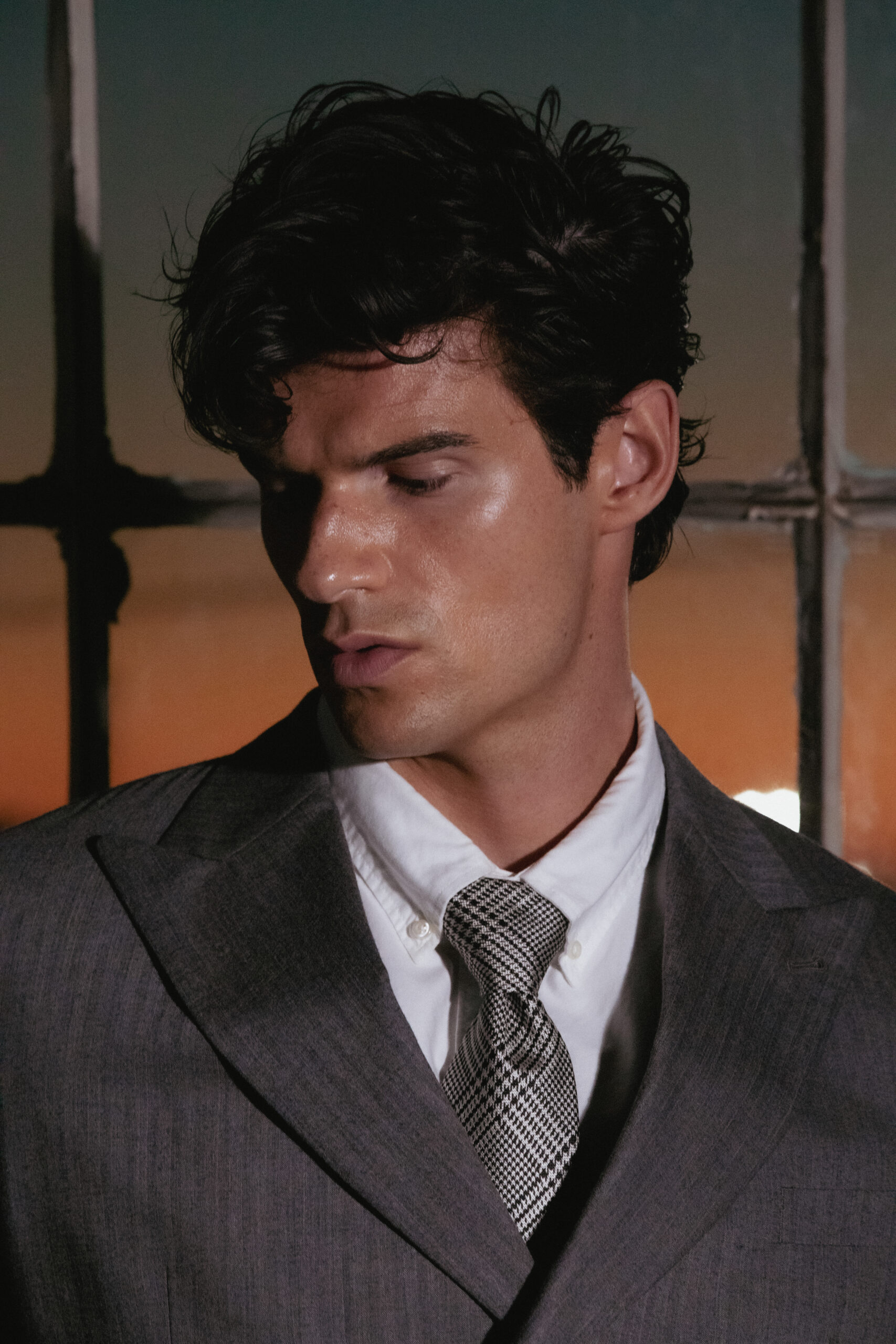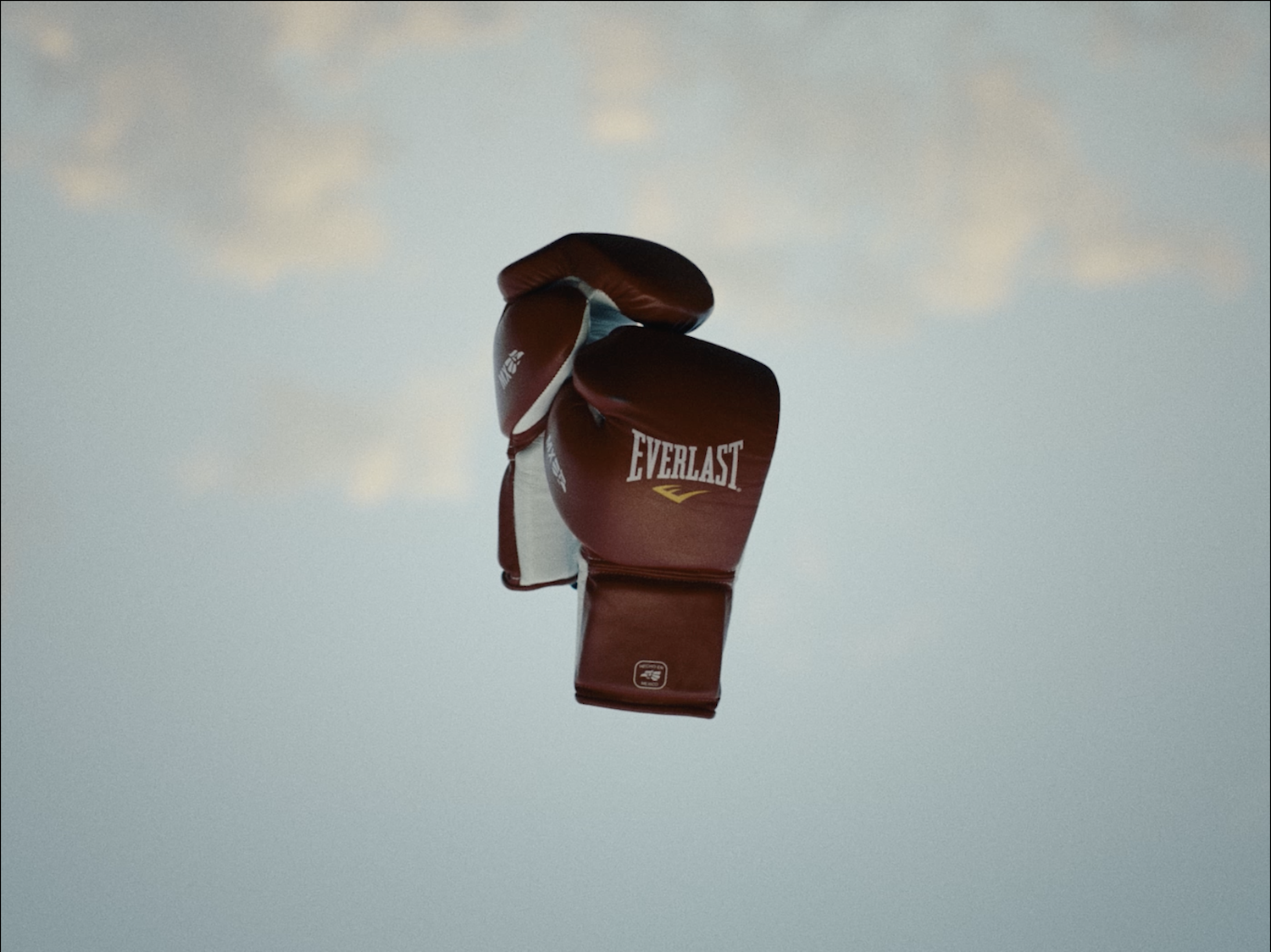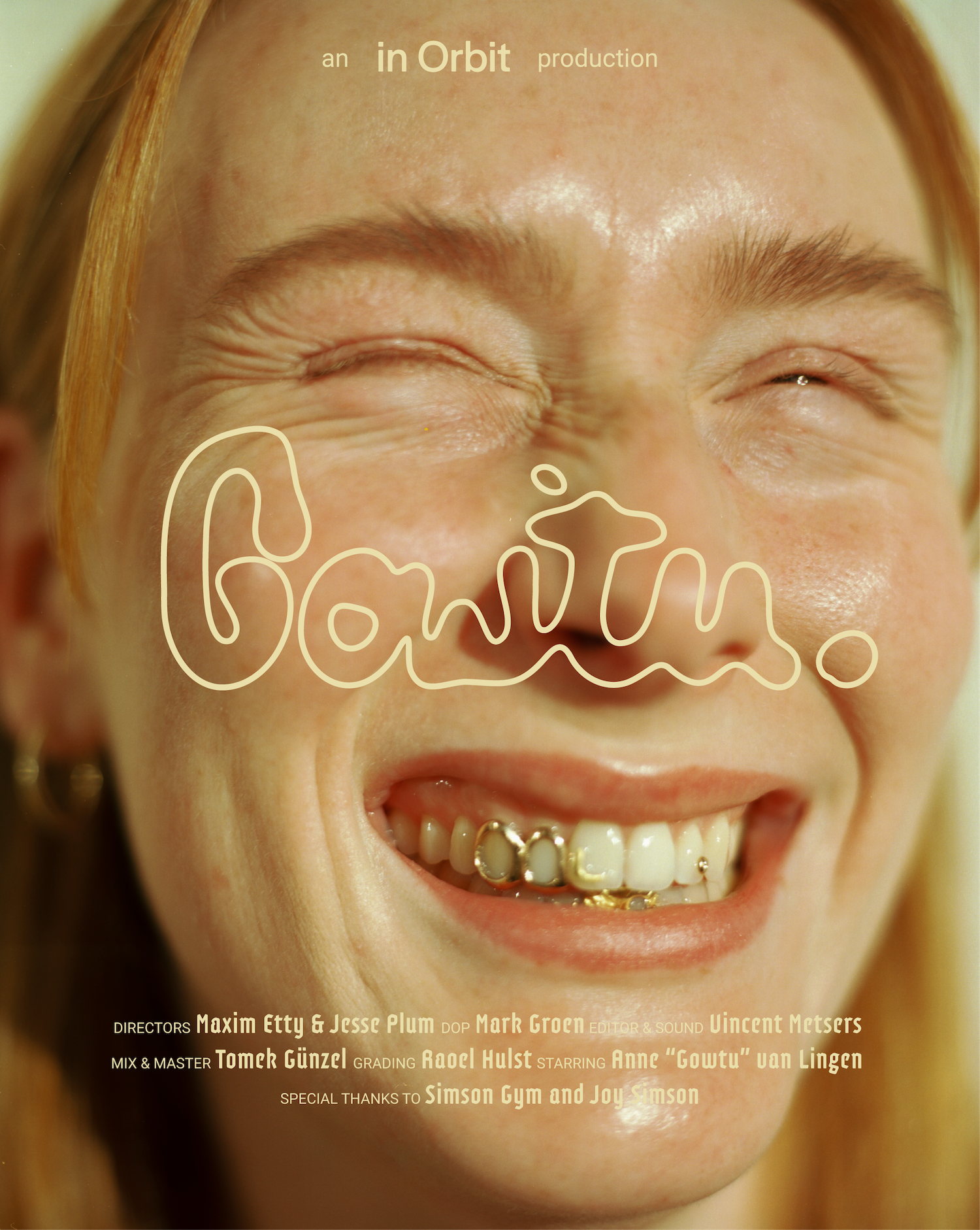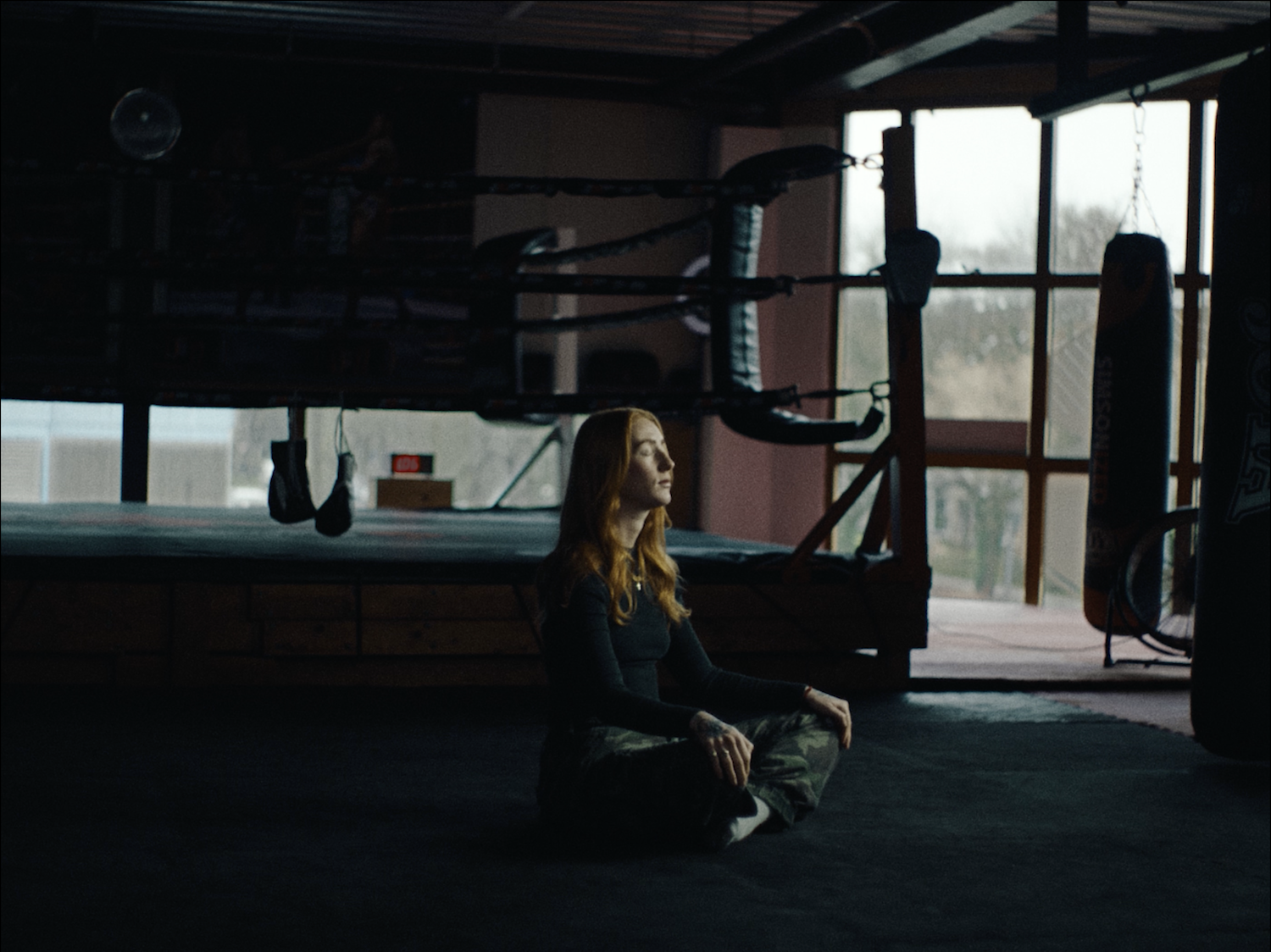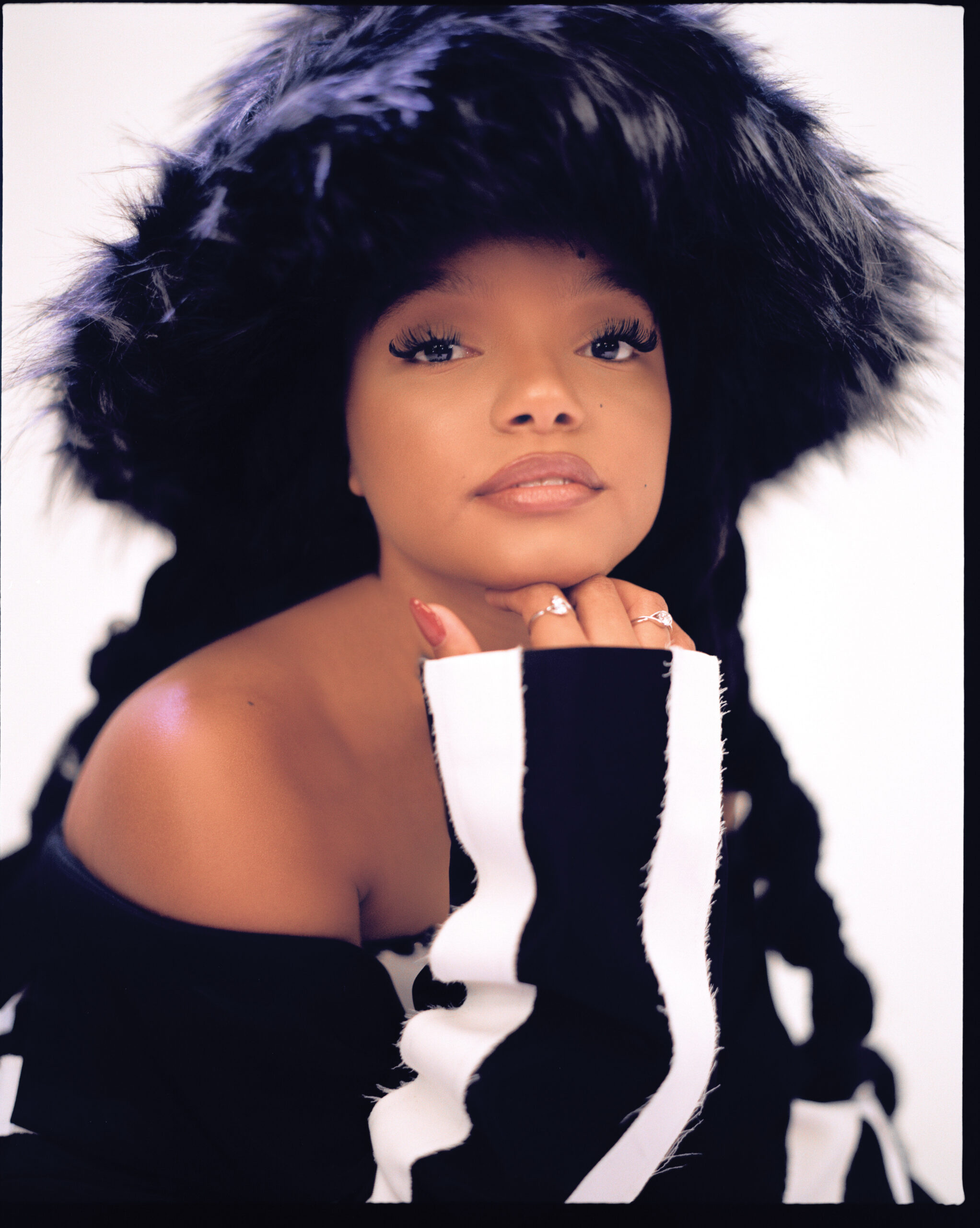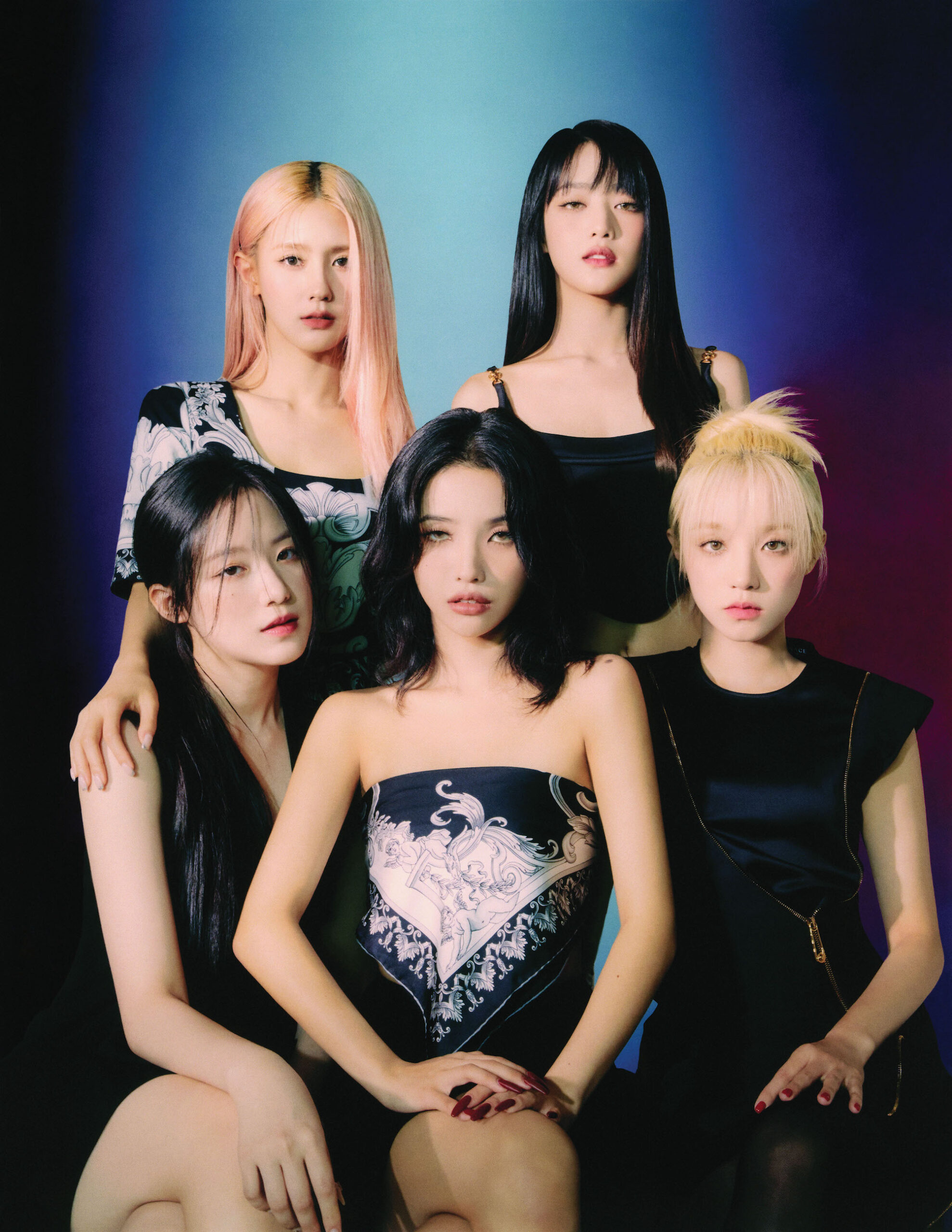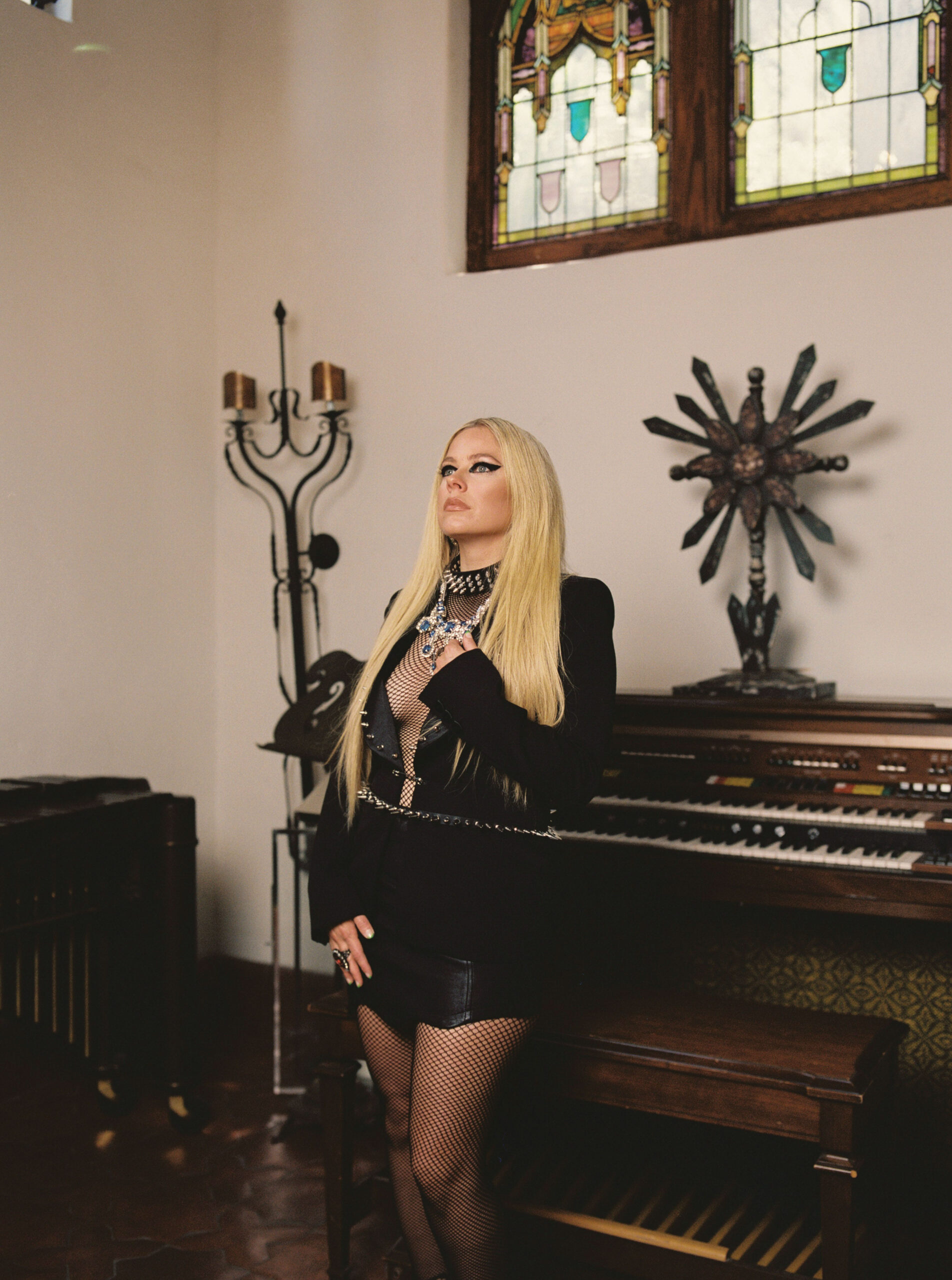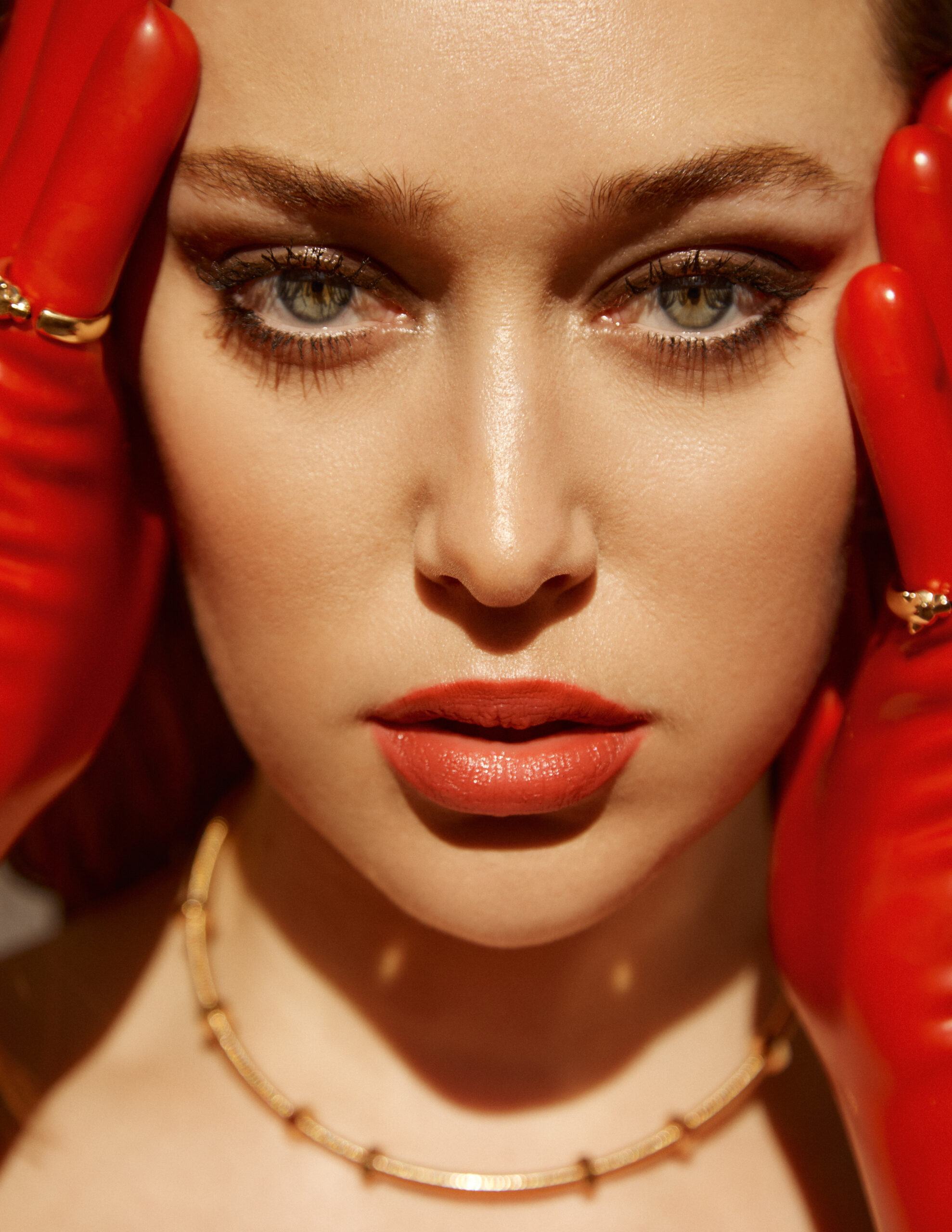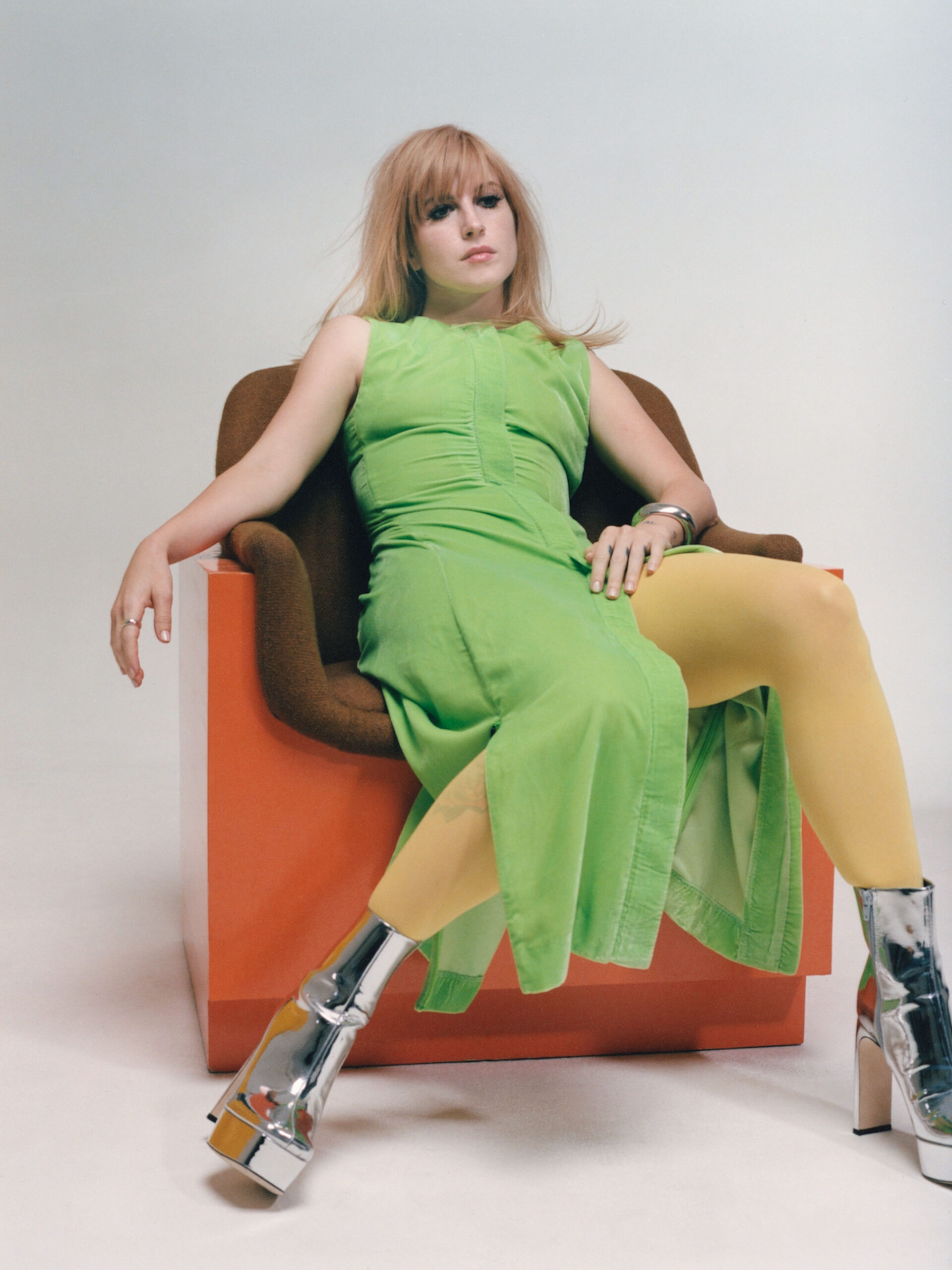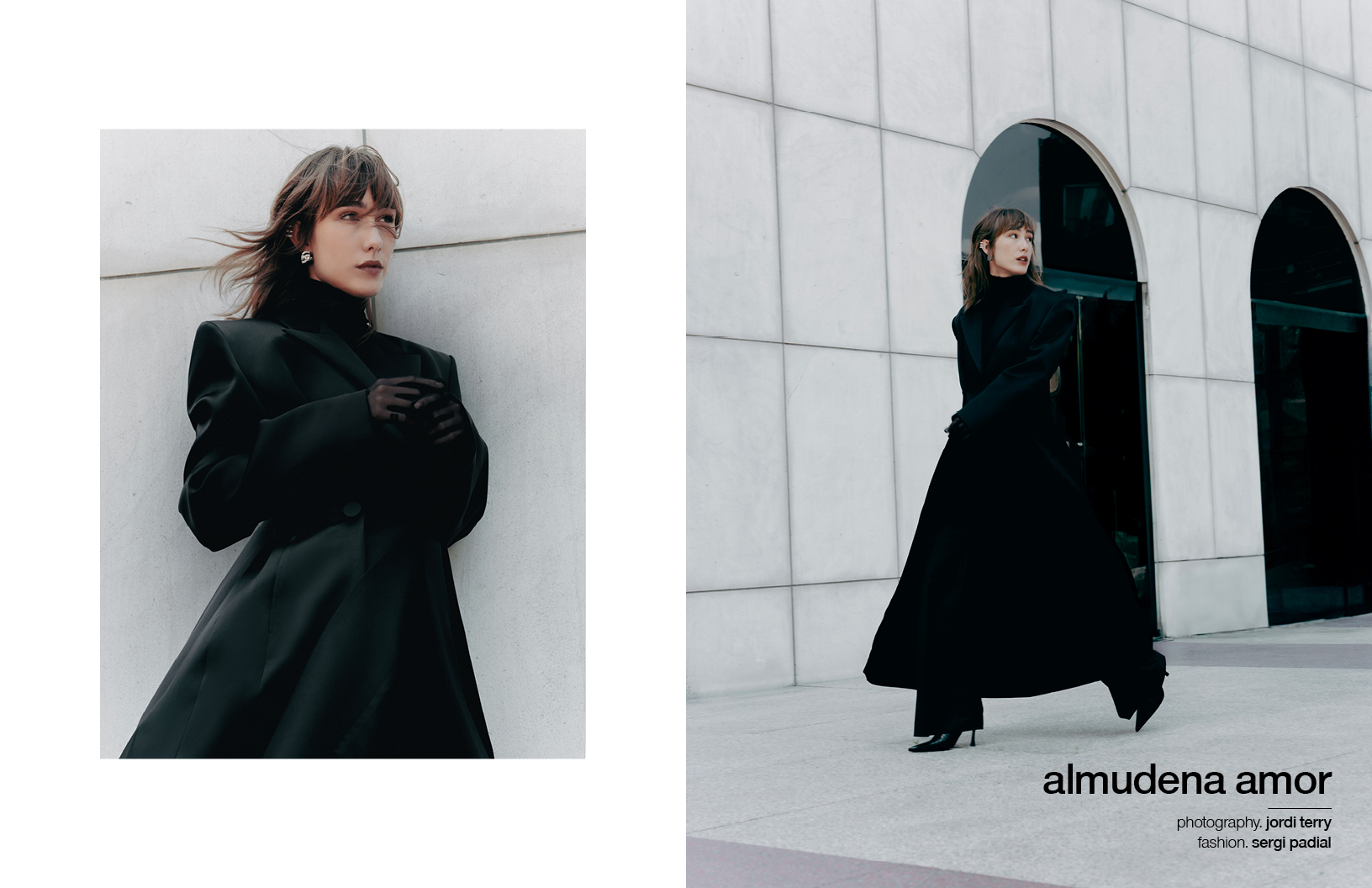
full look. Givenchy
opposite
full look. Givenchy
It’s hard to make sense of, but Almudena Amor has a bit of sun but also a bit of rain inside her. She is a warm, welcoming woman who emanates a special light, just like a sunset. At the same time, she is also like those stormy summer nights, that voice that tells you a scary story in the middle of the night or the mystery hidden in a dark forest. It’s a pure contrast. She is a woman full of nuances and brave and risky decisions. Her first role as an actress was a total declaration of her intentions. Paco Plaza and his horror movie The Grandmother introduced us to a young actress who carried the weight of a film, with the same strength and tenderness as her character suffered the curses of a decrepit harpy.
Her second film, The Good Boss made her duel with a splendid Javier Barden, earning the project the Goya Award for Best Film. And this year, Almudena has managed to lead one of Netflix’s biggest hit shows: The Silence, co-starring the heartthrob Arón Piper. Her character as an elusive and shady psychiatrist obsessed with a young criminal has shocked the audience and elevated her as one of the bravest and most unpredictable performers on the European scene.
Now, after having survived a phenomenon followed by millions of people, Almudena is not willing to get off the terror train and has conquered the 56th edition of the Sitges International Festival with the film Sister Death. It is not only the spin-off of the horror hit Verónica, but also her reunion with Paco Plaza where this time she will not only face diabolical possessions but also the demon of the repressed. But that’s not all, she, along with actor Javier Rey, will immerse in a ghostly story of love and jealousy from beyond the grave in The Sleeping Woman. It’s obvious that this will be a dark ride and we are all ready to enjoy it along the unstoppable Almudena Amor.
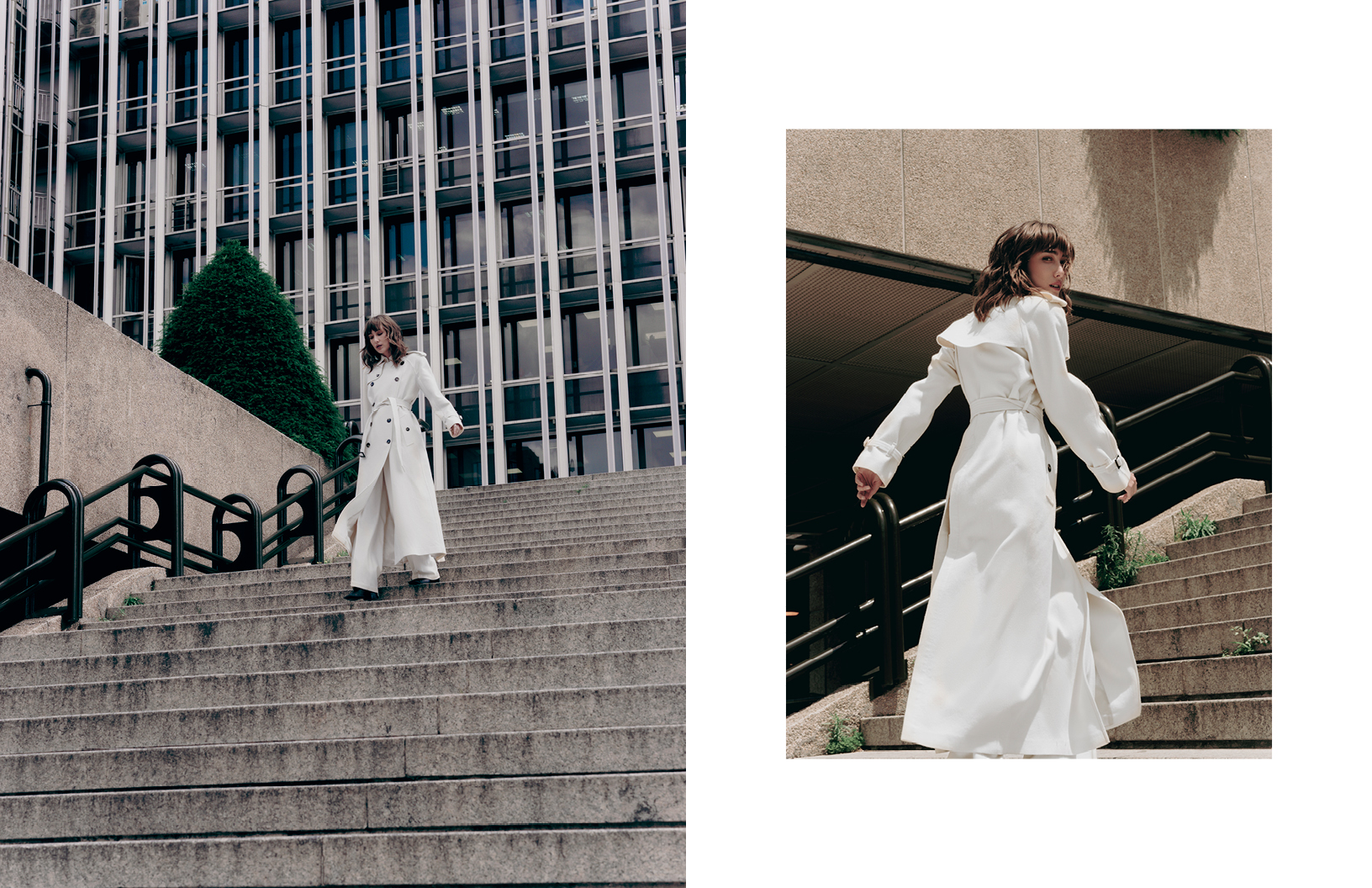
full look. Elvina Belloir
boots. Alexander Wang
opposite
full look. Elvina Belloir
It seems that summer refuses to leave, it is very hot. How have you spent this season?
Summer always feels like the end of the year. It’s the period where you disconnect and travel to other places with your friends. For me, it’s also a period of reflection and disconnection. This year I have been lucky enough to be able to travel and visit friends… I feel that each of these trips and people has helped me get to know myself a little better at this moment and know what I wanted for the beginning of this new school year. The truth is that I have enjoyed this season and it has been great for me in order to consider new routines and personal goals. Adventure suits me very well.
The success of The Silence has been a really exciting adventure, right?
It has been a new experience for me. I had never done a television series or something that was released all over the world at the same time, it’s one of the beautiful things about Netflix, that it reaches everyone. In the series, I played a character, Ana Dussuel, who is very different from me so it was a great challenge. The audience has had a very positive response to the series and I am pleased with the reactions.
And why do you think they chose you for this role?
I think there are many factors and you never fully know the reasons behind those kinds of decisions. It’s true that the character I played in The Good Boss had a psychotic side that I think the cast directors were able to relate to what they were looking for in Ana.
How did you get into the shoes of this complicated psychologist?
She was a character with a complex inner world, requiring deep dives on her mind on many levels. I created her universe from scratch with the help of Fernando Piernas. Together we built her universe and found her way of speaking, of looking, of moving, of reacting to life. She is not an ordinary person so she couldn’t seem like one either. Ana is a person who lives on the edge and has many issues but at the same time what she transmits is a lot of coldness and that’s very far from the way I express myself.
How did you prepare to play the scientific part of your character?
I read books and talked to specialists because I needed to get closer to that universe to understand it better. Although beyond the theory that helps, I feel that in this case, the work focused more on understanding science as a backbone of her personality. Ana is someone who clings closely to science to survive. Beyond her work as a psychiatrist, she is an orderly, calculating woman with a very Cartesian mentality. Her scientific side helps her sustain herself in life.
Of course, and that makes me wonder: how does that scientific side of her coexist with all the madness that she keeps inside of her?
That madness is totally repressed. She has locked her most visceral emotions deep inside. That is why she has found that refuge in science, that comfort away from human emotions.
Have you felt the need to justify her actions?
No, because my work is more about understanding her, entering her world so she can reach the viewer. She was very far from my reality so I had to really get into her universe. I especially remember a scene where Ana visits the juvenile center where Arón’s character is. While she is there he suffers an anxiety attack and my character does not hesitate to pick him up, hug him, and help him until he feels better. During that scene, I was so inside her that I saw it as a totally natural reaction in contrast to what the rest of the cast thought. We talked about it and laughed because we realized that I had already lost objectivity and was observing the reality of the character.
Isn’t it risky to immerse yourself so much in an unhinged character?
I like to immerse myself in the characters when we are filming, but you also have to know how to get out, especially in this type of role that has so many internal conflicts. Although there is usually a certain internal sensation depending on the scene that may remain for a while, I try to compensate for it with other actions. For example, when I went down to the set I always did it listening to reggaeton, dancing, singing… and that helped me to be relaxed, creative, and open without having to be hooked all the time on the suffering that my character is feeling. It’s something that you learn over time, each character, and each scene requires a previous mindset, and as you get to know yourself better as an actress you learn to manage it.
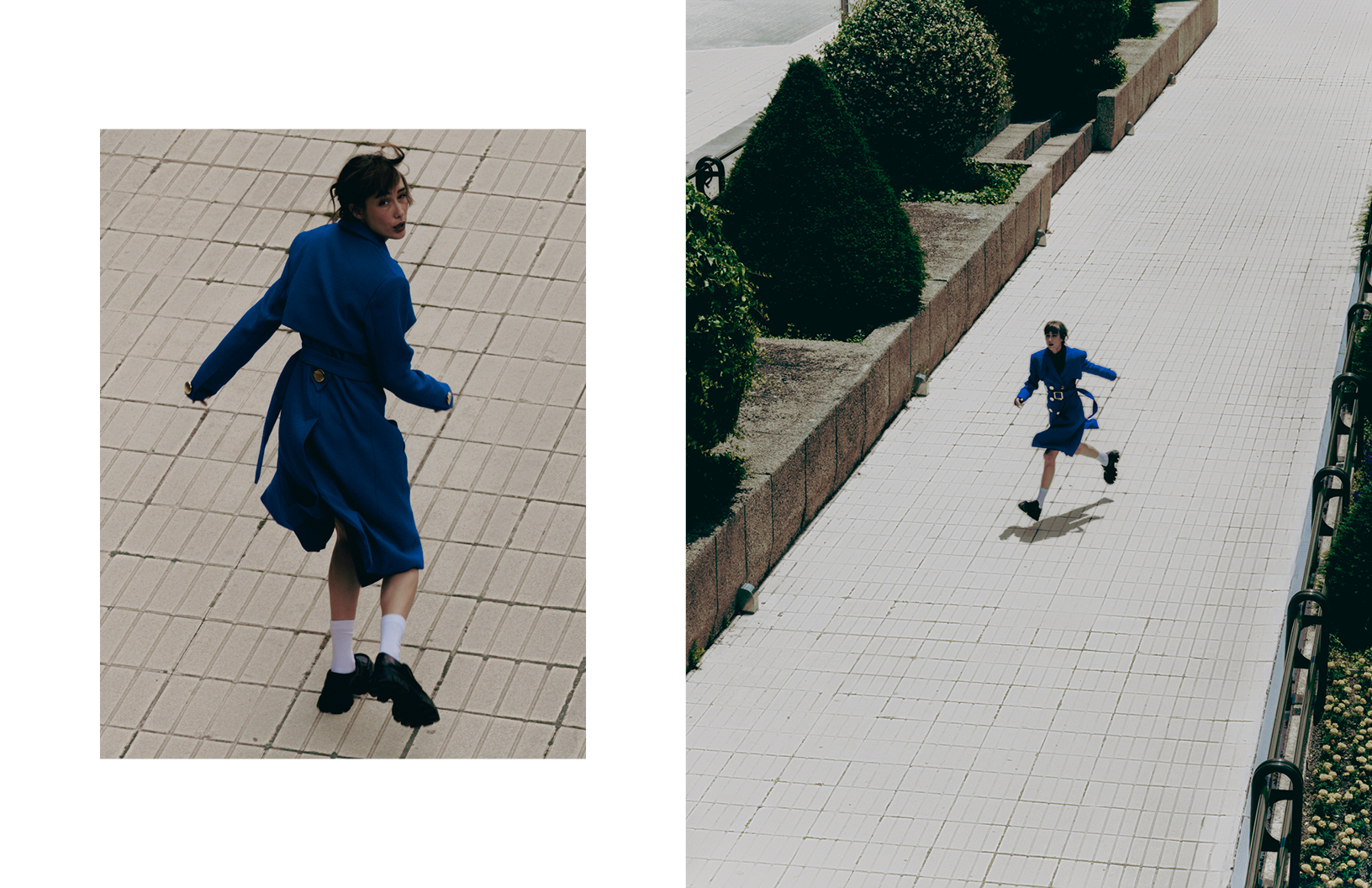
trench coat + shirt. Alfredo Martinez
shoes. Prada
opposite
trench coat + shirt. Alfredo Martinez
shoes. Prada
Would you say that the audience has been able to understand the character?
I suppose there will be people who do and people who don’t. She is not a character that generates attraction at first, she does not provoke empathy; She is cold and distant, she makes many radical decisions, and she is on the edge of morality. We don’t usually see those types of female characters on television. In my opinion, I feel that sometimes the public is not used to seeing women, and even fewer young people, in these types of roles, which can generate rejection. But exactly what is so special and different about Ana’s character is what has also made many people like her and connect with her in a very special way. I have received very nice messages from people who, in some way, felt identified and who thanked me for my work. That kind of feedback feels really, really nice.
What really intrigues me are his intentions throughout the entire plot. Did he really think his plans could turn out well?
The Silence is a modern tragedy. Reading the script for the first time I already knew that the story would not end in a happy note, that like any good tragedy, it would end in death. Very intense, uncontrollable passions beat inside Ana. When that happens and, on top of that, there is someone who shares them with you, everything is doomed to disaster and ruin. She wanted to join Sergio but that was very complicated.
She ends up completely losing control.
Of course, her obsession dominates her so much that she doesn’t see what’s happening around her. She has been repressed and obsessed for so long that she begins to cross red lines and it ends up becoming addictive, like a drug. She feels an unbridled attraction towards Sergio, where maternal instincts mix with very sexual passions. She wants to play several roles in his life.
The ending was very controversial. What do you think about it?
I really like open endings, which allow everyone to build their own conclusion. In life, many times there are situations that remain unclosed, and each person creates their own ending.
Beyond the silence that characterizes Sergio for never speaking to the police, the silence of your character, by keeping quiet about everything she truly feels, is one of the great keys to the series.
Yes. That’s why I think that, when they both meet for the first time, in a certain way, they also discover each other, they find each other. For the first time they both find someone with whom they have a different connection, they recognize themselves in the other, and that somehow frees them. Poetically you could say that, in the end, it’s a part of both of them that falls from the balcony and another that remains, something important changes in that encounter, and they manage to leave behind a weight of the past. It’s not someone who falls, it’s something. It’s a bit of a hippie idea, but I like to see it that way [laughs].
Has Aitor Gabilondo, the creator of the series, given you any clues about the ending he has in mind?
All hypotheses are really possible, that’s the fun part.
I have found a certain parallel between the story of The Silence and the story of the film in which you starred, The Grandmother. This film tells how your character falls into a spider web, but, in The Silence, it is you who is in charge of the web in which you wrap all those involved until you wrap yourself.
Totally, I create the trap that leads to my own ending.
It’s something so intense!
Yes, quite a bit, but I think she wants to fall into that trap. She can’t stand her life, she doesn’t care about anything and she doesn’t think that she has a lot to lose. She only thinks about Sergio, about what he awakens in her.
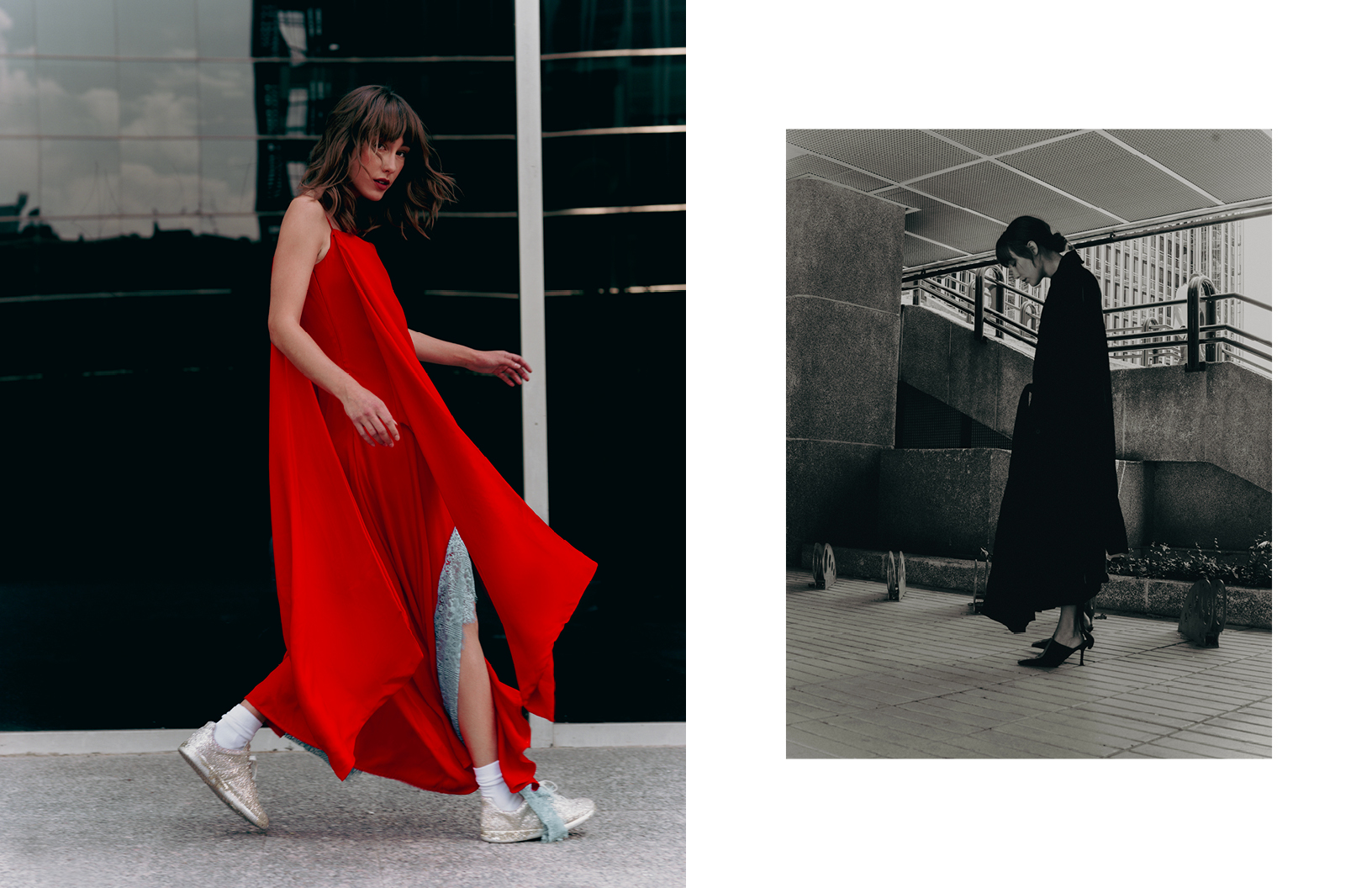
dress. Duarte
opposite
full look. Ferragamo
Ana is a very powerful character.
She is. She is a great character. There are so many nuances within her actions!
Have you been inspired by anyone to play her?
Maybe a little in the film The Pianist by Michael Haneke, because of that pain and those obsessions that take the protagonist to the limit of madness. It’s not that Ana was based on her, but that movie inspired me a lot when I started to navigate within Ana. Apart from that everything was born from the script.
Do you think Ana is a bad person?
I don’t think she is a bad person but I do think she commits negative acts. I liked that she was not an “exemplary woman” character because it is more difficult for her to generate empathy in the audience, it is a challenge because all the characters should generate some empathy. Ana, in the end, is a very self-conscious woman who feels like a weirdo, many conflicts lead her to act in a destructive way even though what she intends is the opposite on many occasions. I really like that this kind of fiction brings us closer to people who are completely opposite to us and invites us to understand them. One of the things I like most about cinema is that it generates empathy.
We have talked before about your film The Grandmother, which was lauded by the audience and critics. One scene in particular, in which your character prepares a soup for the old woman, was highly debated as it was not known whether she had prepared that dish so that the grandmother would choke and die…
Yes. She prepares it for her to choke on.
It is very shocking that the two are granddaughter and grandmother and such a dark relationship is formed on the part of the eldest due to the desire to possess her youth and kill her.
Of course, it’s because of a grandmother that you stay and endure all the events that my character endures. You don’t do that for just anyone. I also have to tell you that I don’t think they were really family. I suspect the grandma kidnapped her from some orphanage. Paco has never told me anything about this, it’s something I believe. A kind of intuition. That’s why the soup scene is key because it’s when I realize that that lady is not my grandmother, that she is an evil being.
The ending is so intense…
For me, it was very exciting to film it. It was my first film. I connected a lot with the character because I love my grandmothers very much and I have a very close relationship with them. Doing it was something very important for me on a personal and professional level. I remember filming the final scene with all those gasps, that darkness, and… just “wow.” I feel very lucky to have made that film debut.
Do you like scary movies?
I have to confess that they are not my favourites! [laughs]. I really like Suspiria by Dario Argento. The original and the remake by Luca Guagdagnino. And there are more titles that I really like but it is true that it is not my favorite genre to watch.
Now you inaugurate the 56th edition of the Sitges Festival, where horror cinema reigns. Having participated in several films of this genre, do you understand the connection that a horror fan feels?
I completely understand it. When you go to that festival the passion of the audience is very present. Everyone gives themselves completely to the movies, they enjoy them and express it, it is very fun to be in those screenings, it is quite an experience to go to Sitges.
I need to ask you this: what are you scare of?
There aren’t a lot of things that scare me. I guess I’m afraid of suffering or that people suffer, diseases, violence, hatred… things that are sometimes inevitable so I try to avoid the feeling of fear because it is paralyzing and doesn’t help, I prefer to turn that fear into love and fight for what I want.
Sister Death is the spin-off of Verónica which was a success at the box office and is considered one of the scariest films in recent cinema. But, beyond that, it was the story of a teenager facing adulthood. What were you like when you were Veronica’s age?
Well, I was a pretty funny girl, really, I grew up very fast and I was game for all the possible plans, I really wanted to experience everything. Luckily, over time I began to relax [laughs].
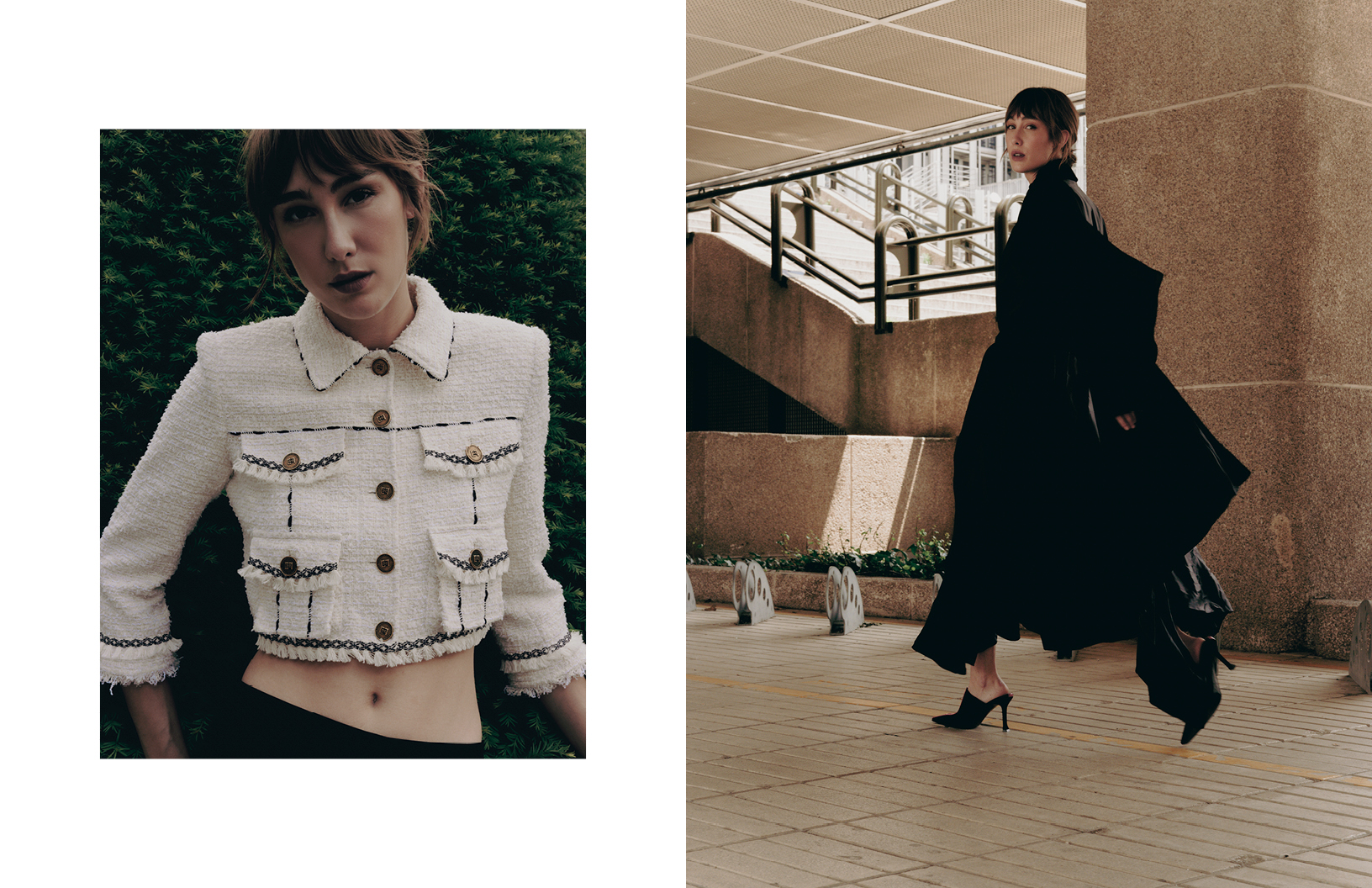
jacket. Elisabetta Franchi
trousers. Alfredo Martinez
opposite
full look. Ferragamo
This new film takes place in a convent, you play one of the nuns. How was the experience?
It has been incredible. Filming with Paco Plaza is always a good experience and I really liked the story since I read the script. I have a character who experiences very extreme and even surreal situations, as an actress it has been a very fun challenge to embody.
Exorcism films, to a greater or lesser extent, deal with the issue of faith as either a creative or destructive element. What does Almudena Amor believe in?
Well, although it may seem like a joke with my last name, I believe a lot in love, and more and more I think that everything has to do with love. I’m also a bit of a witch and I really like understanding energies, astrology, and cards, I believe and I’m quite guided by the unseen.
This year you also release The Sleeping Woman, a much more ghostly story that deals with a story where presences and absences of all kinds are the protagonists. Do you believe in the paranormal? Have you had any experiences that are difficult for you to explain in a logic way?
I do believe in some paranormal things and I have had experiences that seem completely taken from a script. I think that life is full of these things but that many times we do not pay attention to them, there are people who think that it is a mental suggestion but in many cases, I do not believe it, and I do believe that there are things out of our controls, that we have not yet been able to understand but are actually there.
The film also talks about what unites a couple, the indestructible bonds. Nowadays, loneliness affects us all, how do you deal with it? Do you consider yourself a lonely person?
Well, I feel like I have both sides. I have a side that sometimes needs solitude and another that loves to socialize, it depends a little on the moment. I used to think that the idea of loneliness was scary and still is. But now, I feel very accompanied by myself and it is a feeling that is more present every day, it gives me a lot of strength.
Is the movie industry in Spain a friendly place to work?
That is a slightly complicated question for me since I’ve been at it only for three years. In my experience, it has been a friendly place, but there are all kinds of experiences. It is a screwed industry because there are few actors who can make a living. And then in terms of experiences on the industry, it depends on the people you meet and the moment you find yourself in, I guess. I feel that in this job it is very important that you know yourself, that you know how you feel, how certain spaces and certain situations make you feel. This work can be complex sometimes, you expose yourself, you feel vulnerable, and there are also moments when the phone doesn’t ring and you have to take care of yourself with a lot of love and compassion. I rely a lot on my family and my friends, I go to therapy or to dance lessons… and I feel that all of these things help me to stay calm to be able to make good decisions or not suffer so much with the bumps, although there are always moments where you feel more vulnerable.
Now I think that in this country they are taking more risks with the projects that are producing but I would like to know if you would be willing to accept roles out of Spain…
I would love to work abroad too. I have always travelled a lot, I have already gone to other countries alone for work and I have learned a lot. I have never been afraid to go around the world by myself, I am very adventurous.
Almudena, do you believe in luck?
I think that sometimes you do get lucky but that not everything is a matter of luck. In this job, I feel that there is a factor of luck but above all, it is a lot of work, hard work both on a personal and professional level. I like to believe that step by step we are all finding each other and that if you are in sintony with yourself, those dreams are easier to fulfill regardless of luck.
Do you think a lot about the future?
I would love to continue working as an actress. In this job, I really like the fact that you are always learning. Sometimes I imagine what kind of woman I will be in twenty years and how I will have transferred everything I have learned to my future self. I have the feeling that when I perform I do it with a lot of empathy towards my character and I think that that empathy also ends up being transferred to the audience. So I believe that if over time I generate more empathy and understand more the roles I play, I will also understand and transmit people’s feelings more deeply. That seems like an incredible power to me, it’s something super beautiful that motivates me a lot as a person.
Of all the moments you have experienced so far in the cinema, which one would you choose?
I hold with special affection the moments in which we wrapped up The Grandmother in Paris, next to the Seine River. It was my first film, my first last day on set. I have been to that city many times but finding myself there while filming the last scene of a movie was very, very exciting. I couldn’t believe how lucky I was to be living all that in a place like Paris and doing it being something I had always dreamed of — an actress.
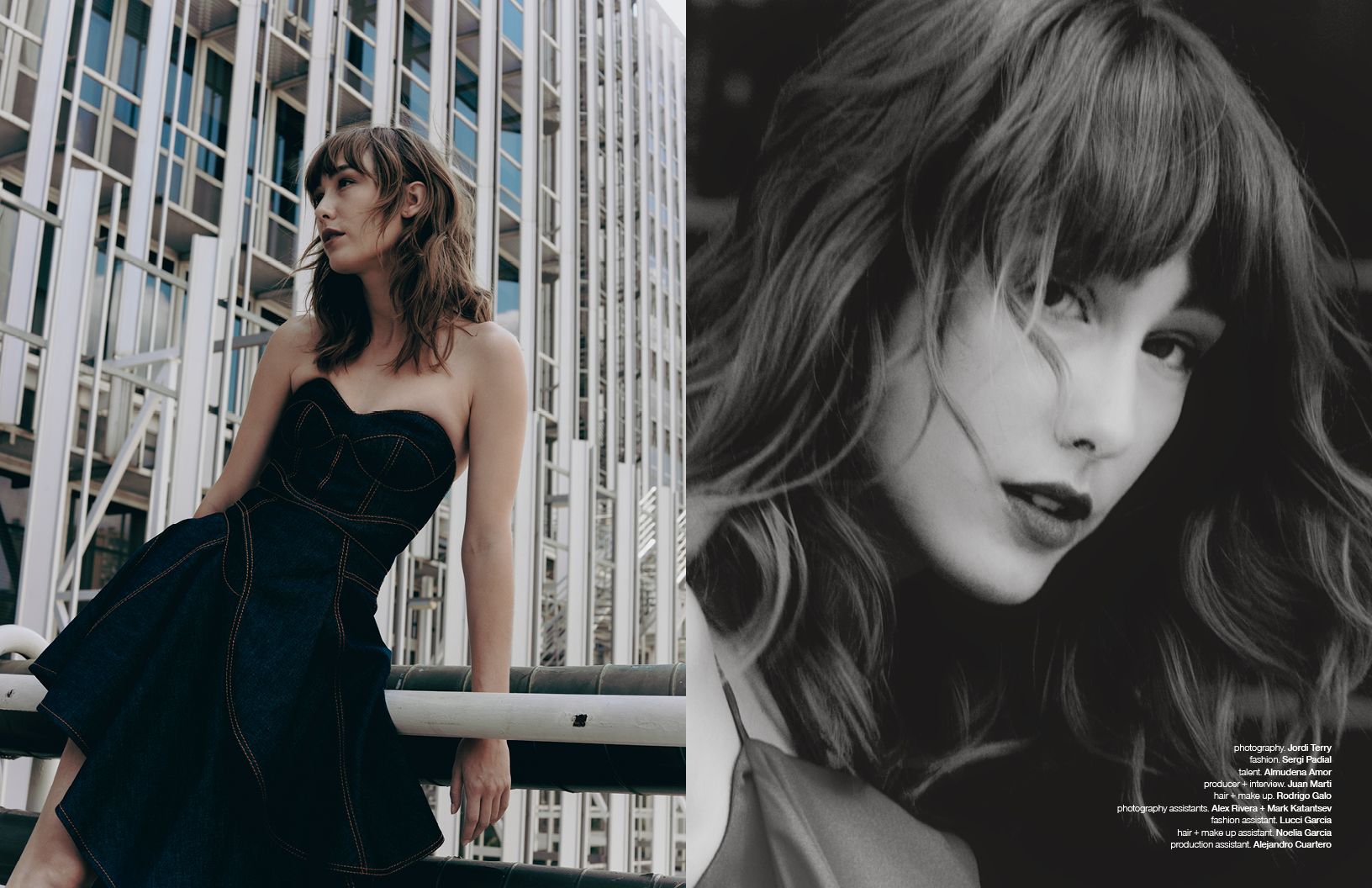
full look. Alexander Mcqueen @ Santa Eulalia
opposite
dress. Duarte
photography. Jordi Terry
fashion. Sergi Padial
talent. Almudena Amor
producer + interview. Juan Marti
hair + make up. Rodrigo Galo
photography assistants. Alex Rivera + Mark Katantsev
fashion assistant. Lucci García
hair + make up assistant. Noelia Garcia
production assistant. Alejandro Cuartero






